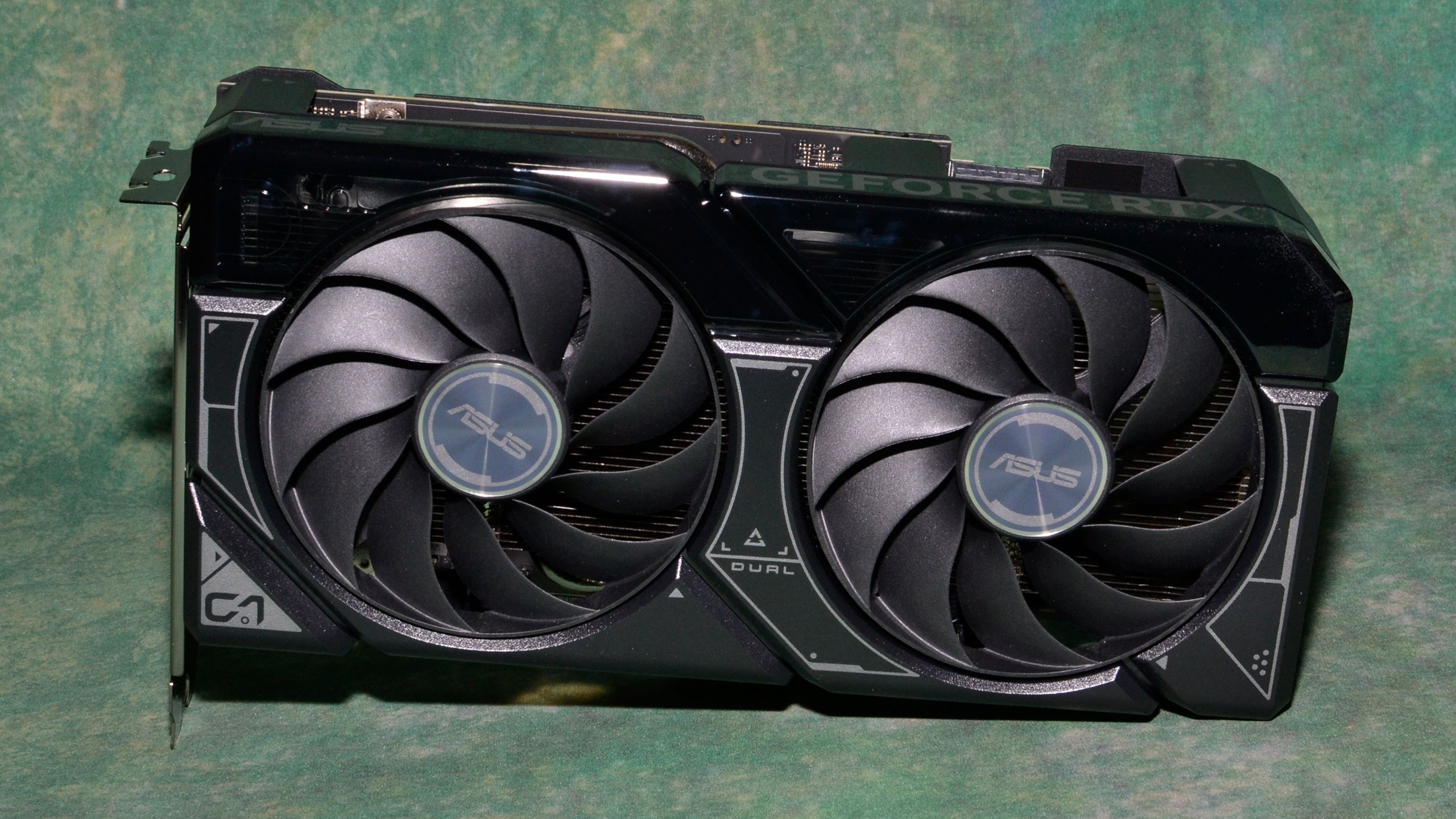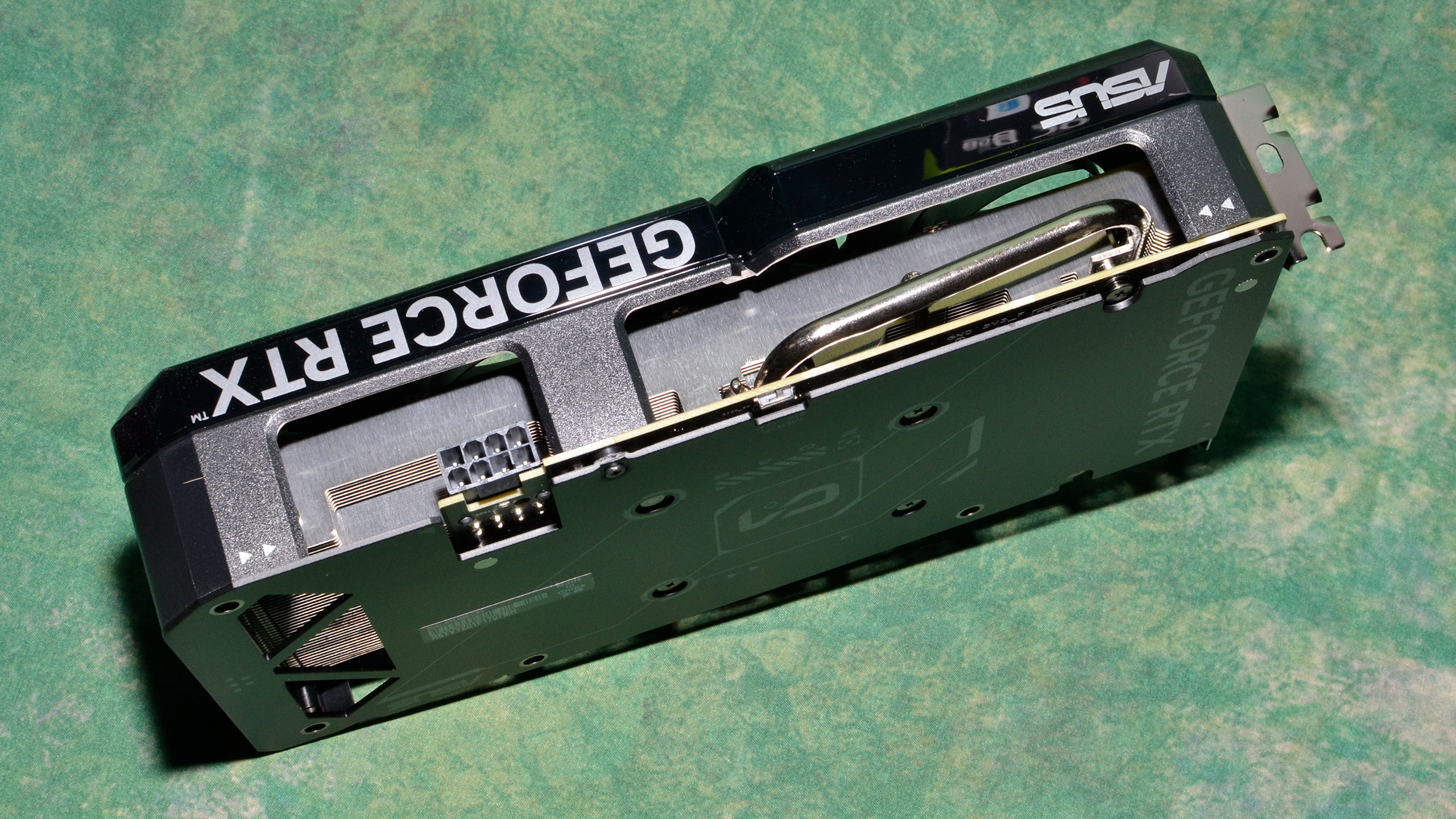Why you can trust Tom's Hardware
We've been working on this for a while, retesting all the GPUs on our new test PC using an Nvidia PCAT v2 device, and we've finally made the switch from the Powenetics hardware and software we've previously used. The benefit is that we're now using data from our full gaming suite, rather than just a couple of specific tests. The charts are the geometric mean across all 15 games, though we'll also have full tables showing the individual results — some games are more taxing than others, as you'd expect.
Our new testing approach also provides data on GPU clock speeds and temperatures (but not fan speeds), and we'll have separate charts for 1080p medium, 1080p ultra, 1440p ultra, and 4K ultra. Besides the power testing, we also check noise levels using an SPL meter. This is done at a distance of 10cm from in order to minimize noise pollution from other sources (like the CPU cooler).
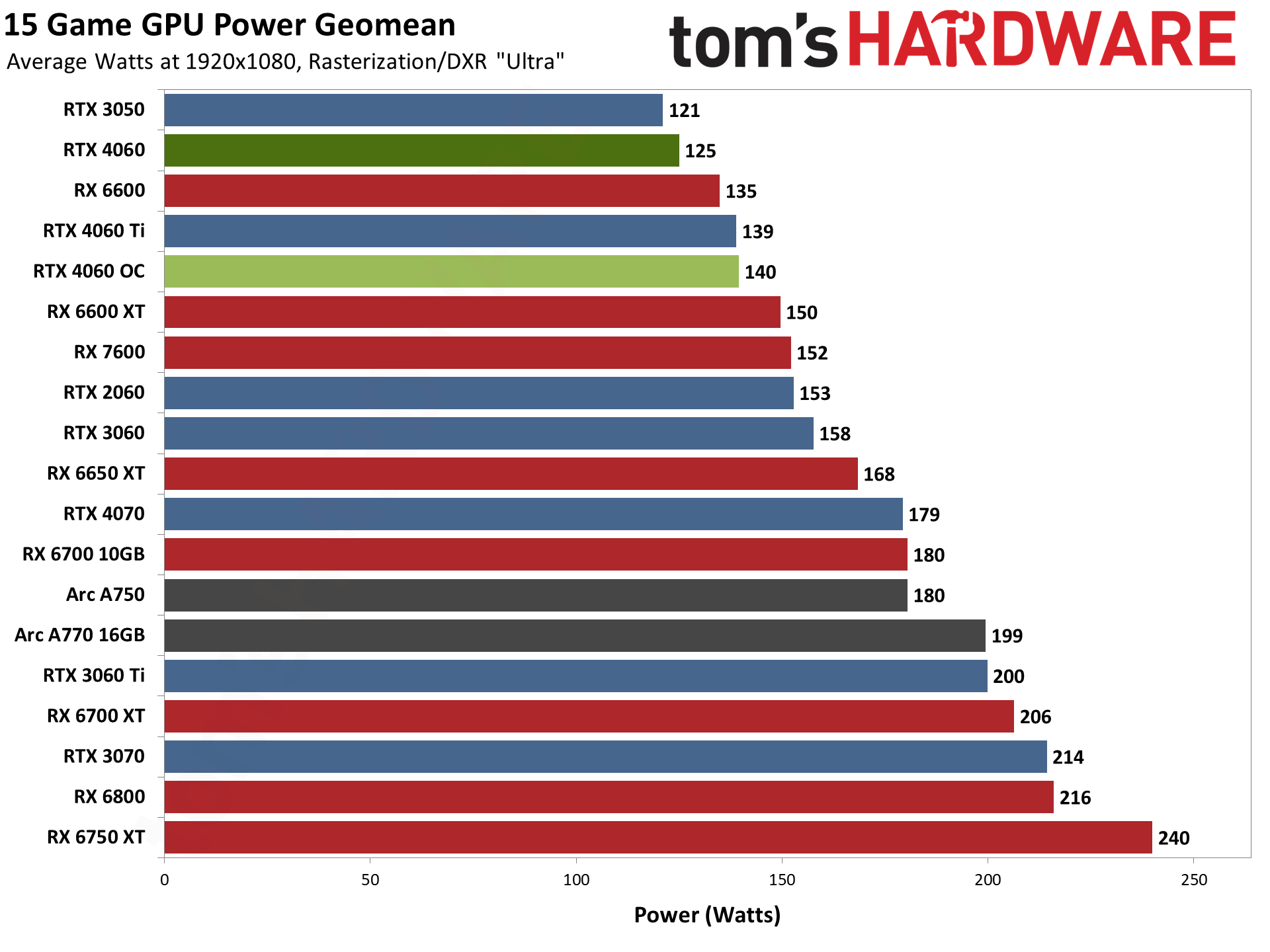
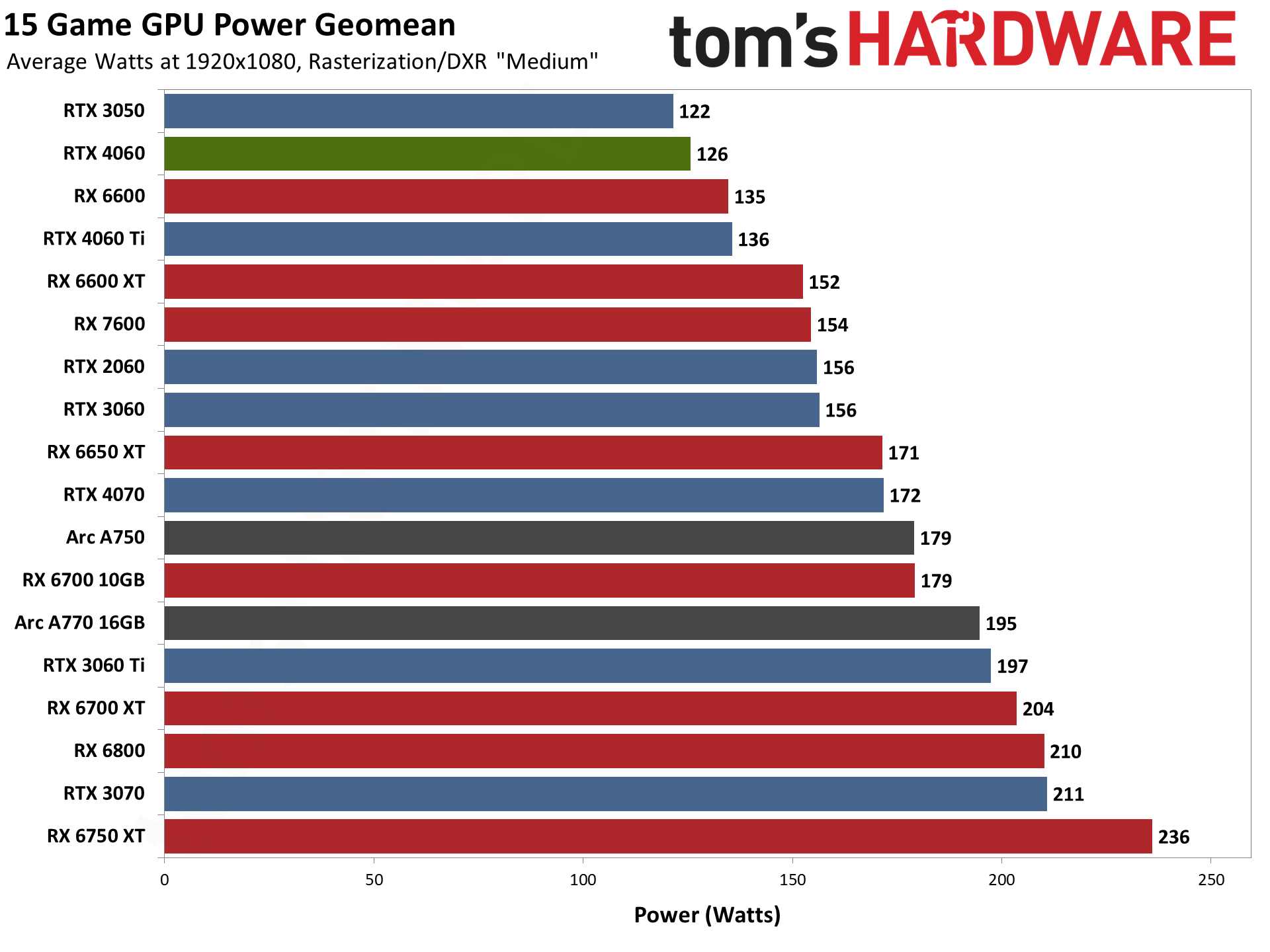
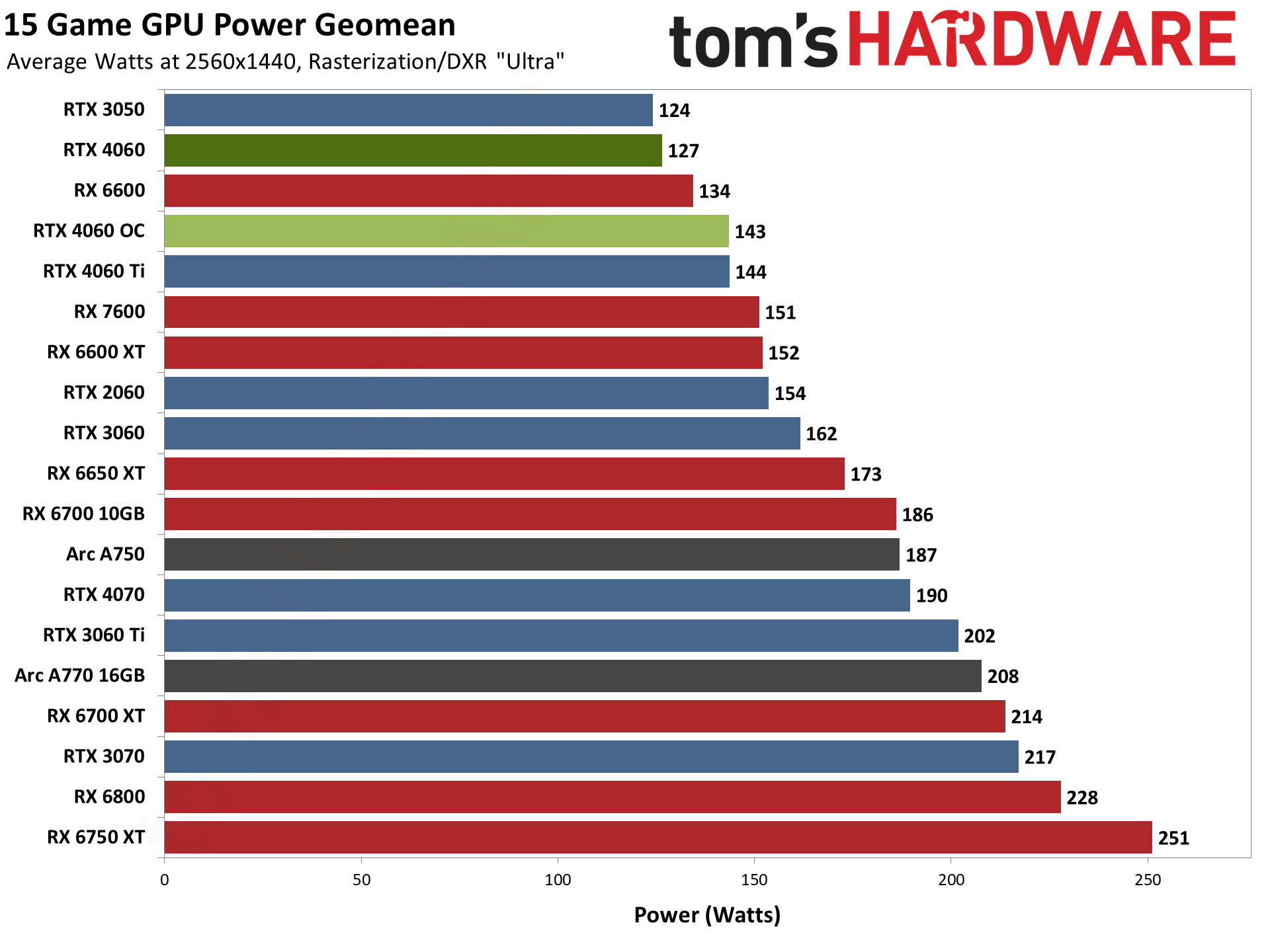
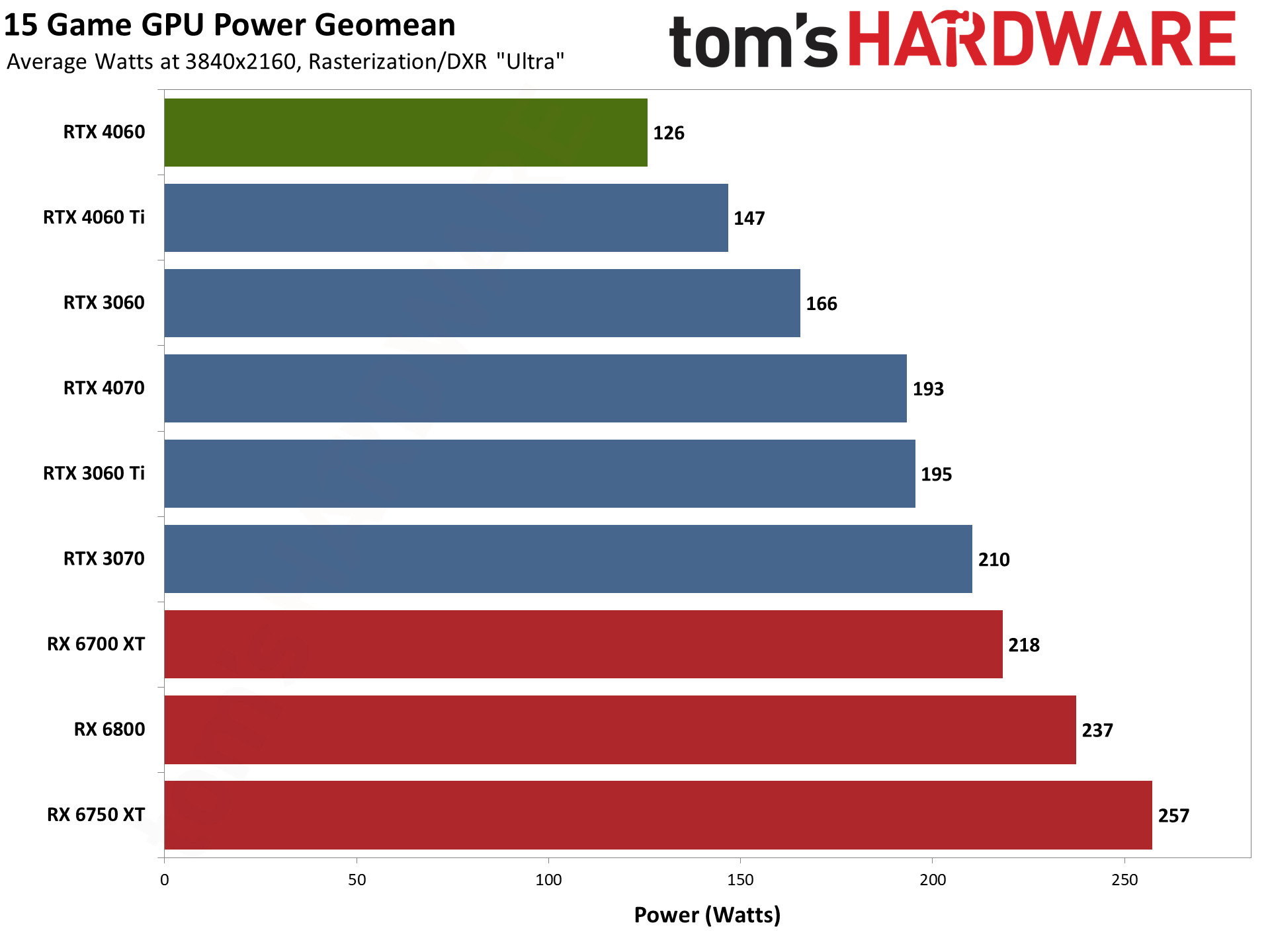
Starting with power consumption, the RTX 4060 has a nominal TGP (Total Graphics Power) of 115W. However, the Asus RTX 4060 Dual OC appears to have a slightly higher power limit of around 130W, based on our testing. On average, at 1080p ultra the Asus card consumed 125W. The other resolutions and settings don't change that too much, with average power use of 126–127 watts.
The result is a good overall efficiency score of 0.537 FPS/W at 1080p ultra, but that's not as good as the RTX 4060 Ti's 0.597 FPS/W. AMD's RX 7600 meanwhile lands at 0.361 FPS/W, while the RX 6700 XT only achieves 0.320 FPS/W. Overclocking doesn't change the efficiency too much either, with the 4060 OC still getting 0.525 FPS/W. Anyway, depending on where you live and how much you pay for power, these metrics can be an important factor.
Consider a moderate 15 hours per week of gaming (an hour or two on weekdays and then some longer sessions on the weekend). AMD's RX 6700 XT might be generally faster, but it consumes 80W more power. Over time, that adds up to 62 kWh per year. If you're lucky and only pay $0.10 per kWh, that's only $6, but some places like California can pay up to $0.30 per kWh, or $18 per year, and various places in Europe are in the $0.50 per kWh range — $30 per year.
Sure, that's spread out over twelve months, but it's something to think about. You could potentially buy a more efficient GPU and end up paying less in power costs. If you play a lot of games, which we know some people do, the difference in electricity costs could be even wider. It's food for thought, anyway.
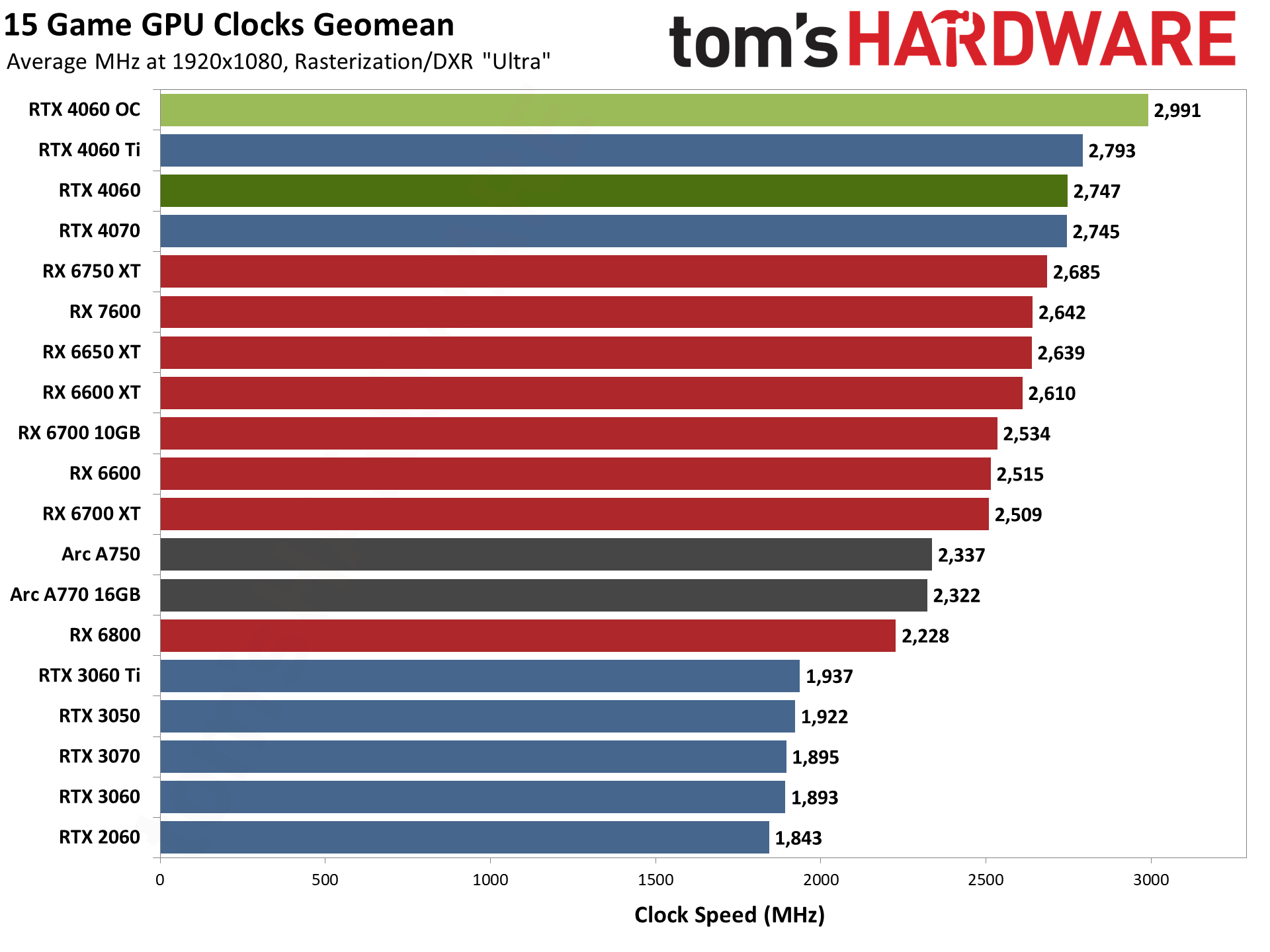
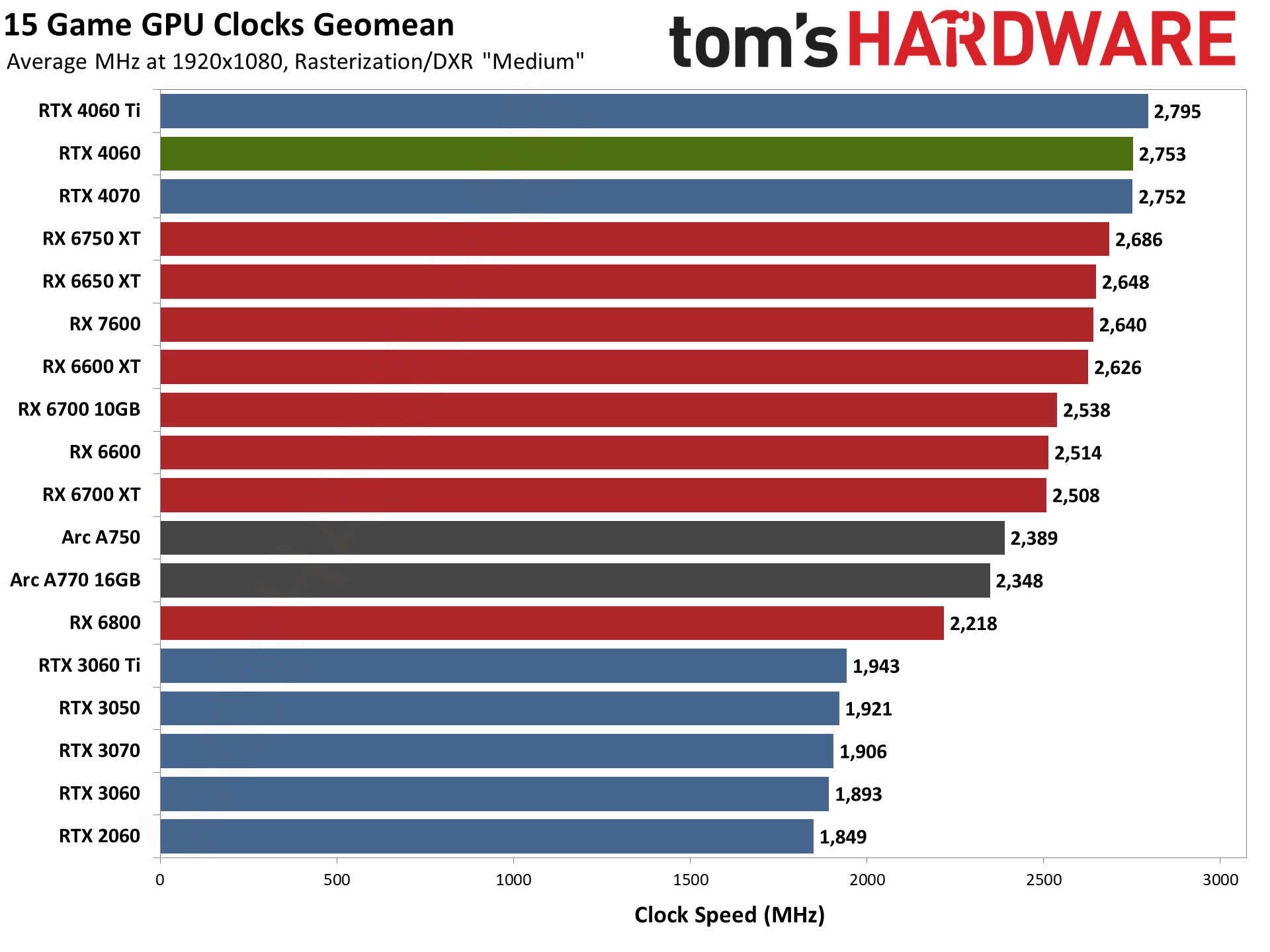
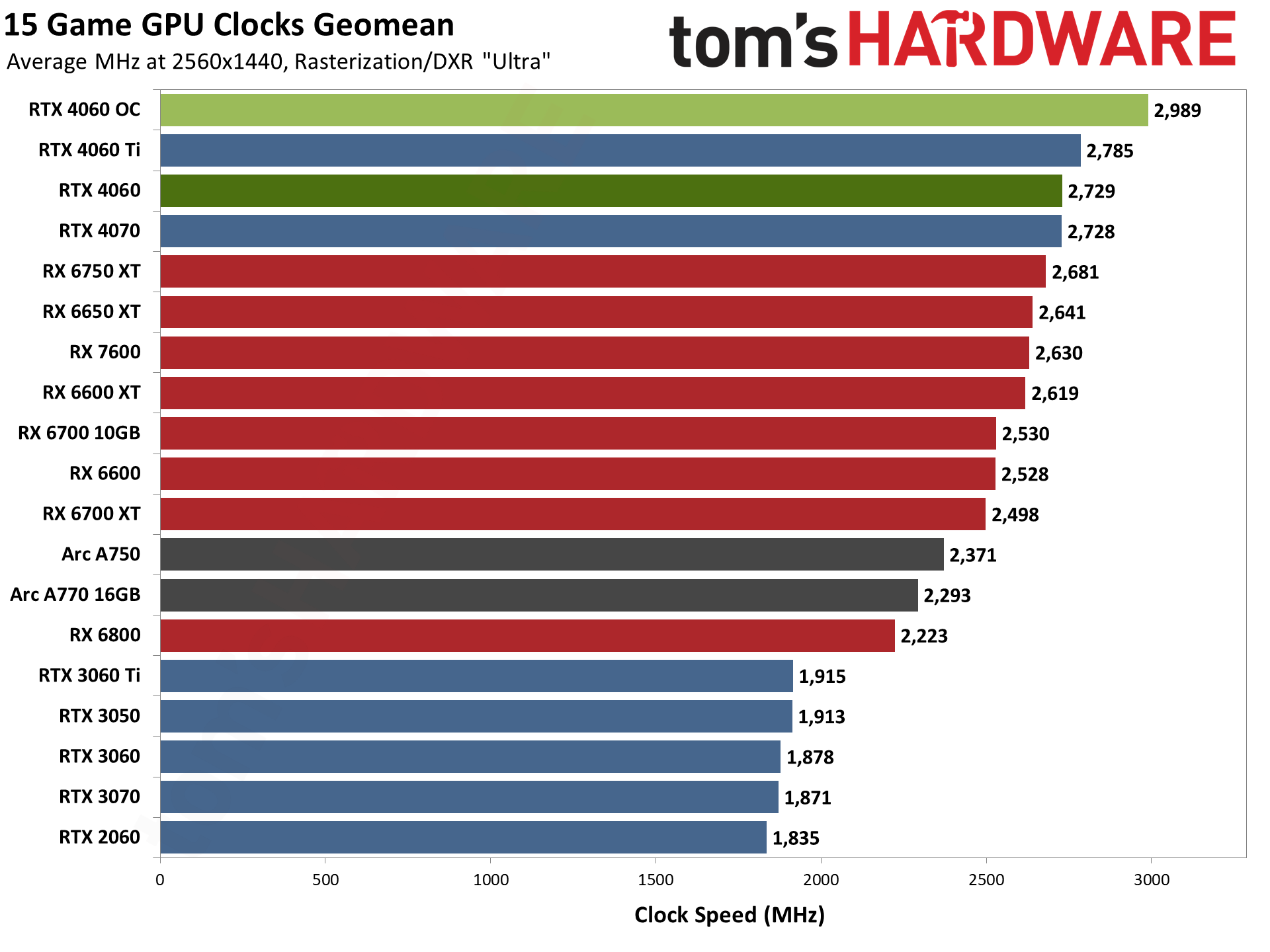
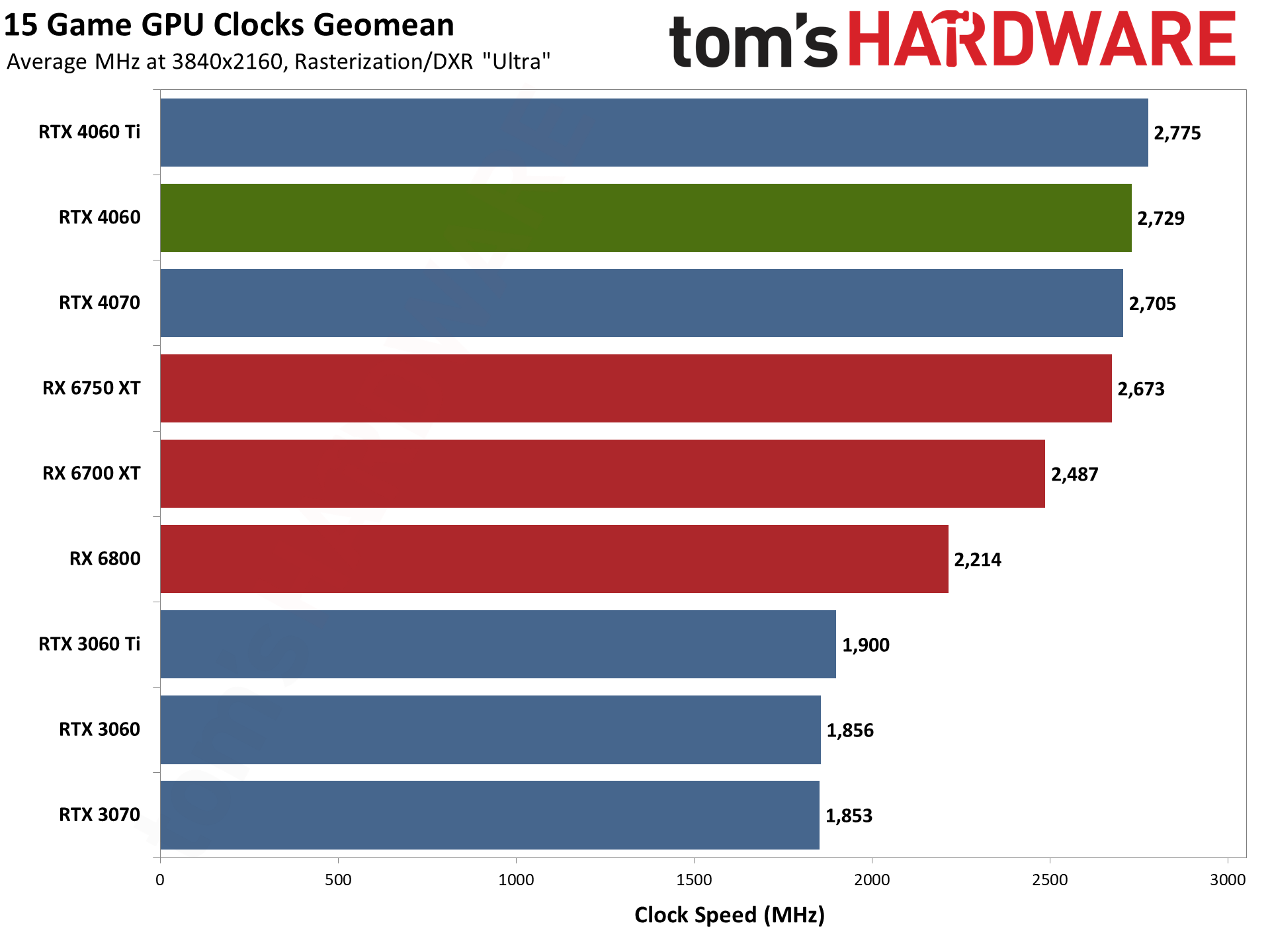
GPU clocks aren't super meaningful, in and of themselves, but the Asus RTX 4060 averages about 2750 MHz across our test suite. That's roughly 200 MHz higher than the rated boost clock, which is typical of what we've seen with Nvidia's RTX 40-series GPUs. Our +200 MHz overclock, with a 120% power limit, boosts average GPU clocks to just under 3GHz, a rather impressive result.
It's nice to finally see Nvidia GPUs breaking the 2GHz barrier with ease. Higher clocks can reduce overall efficiency in some cases, but the combination of the Ada Lovelace architecture and TSMC's 4N process node proves potent. You have to wonder if we could start seeing 3GHz and even 4GHz GPUs with the next generation parts.
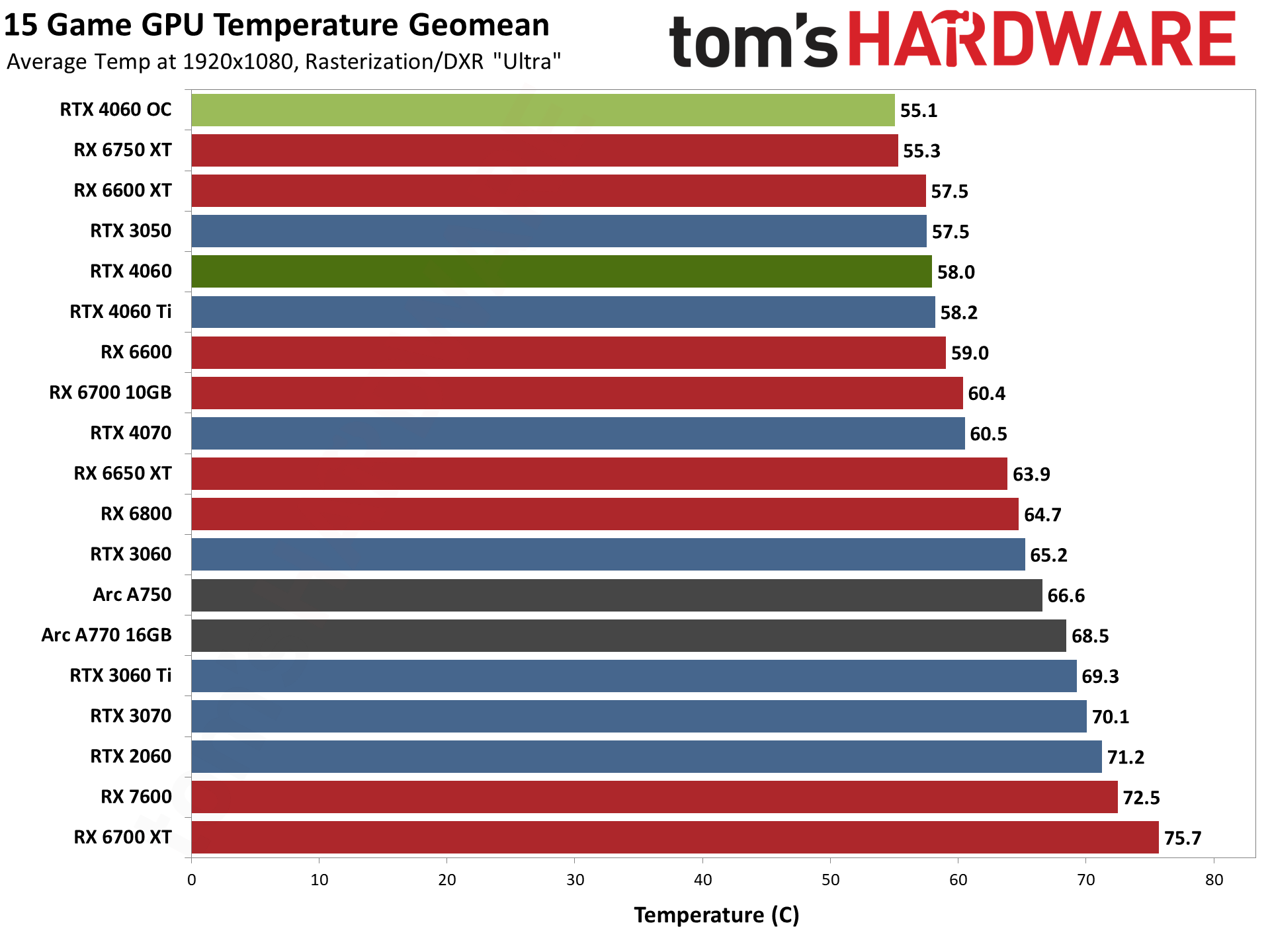
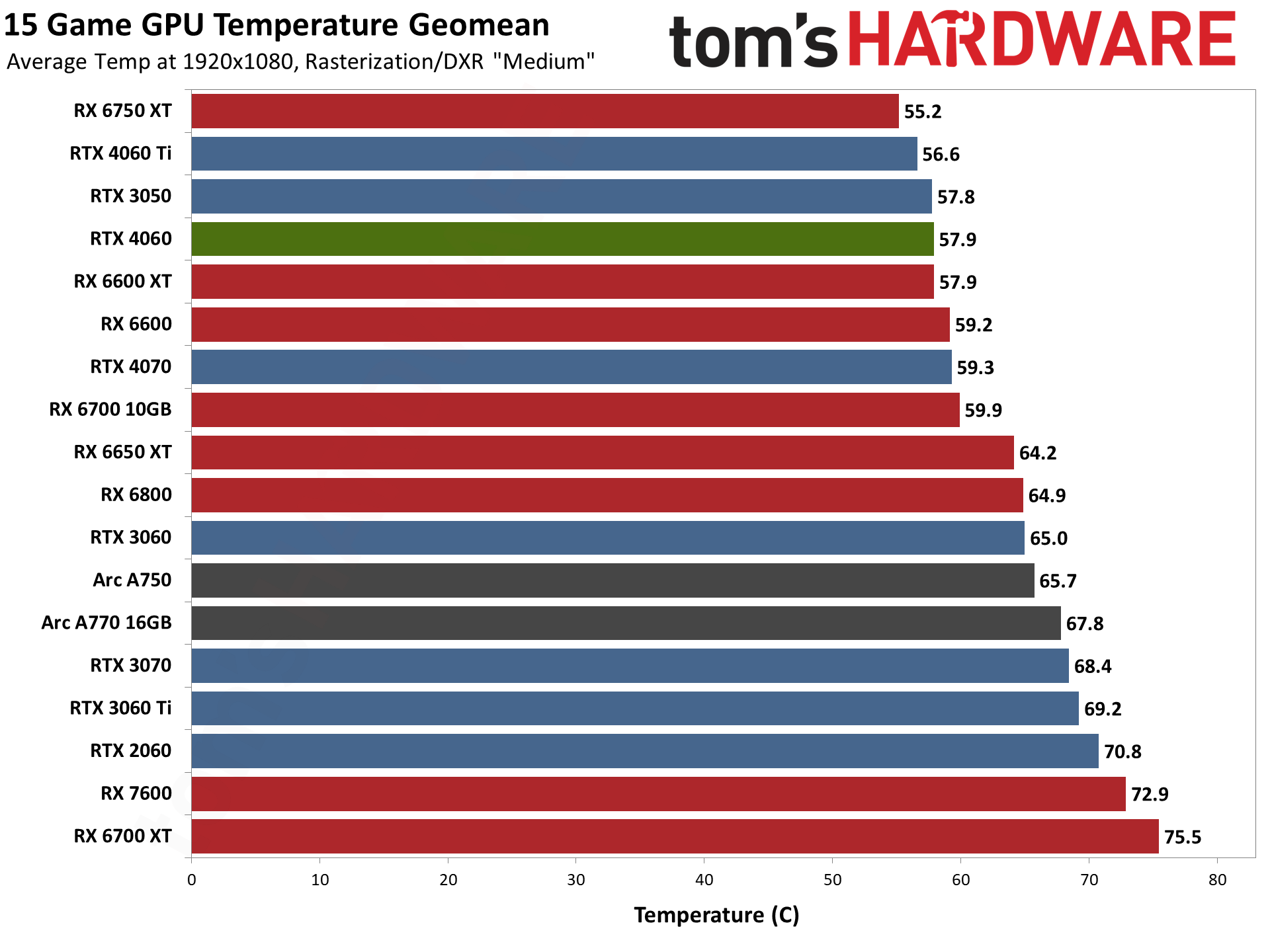
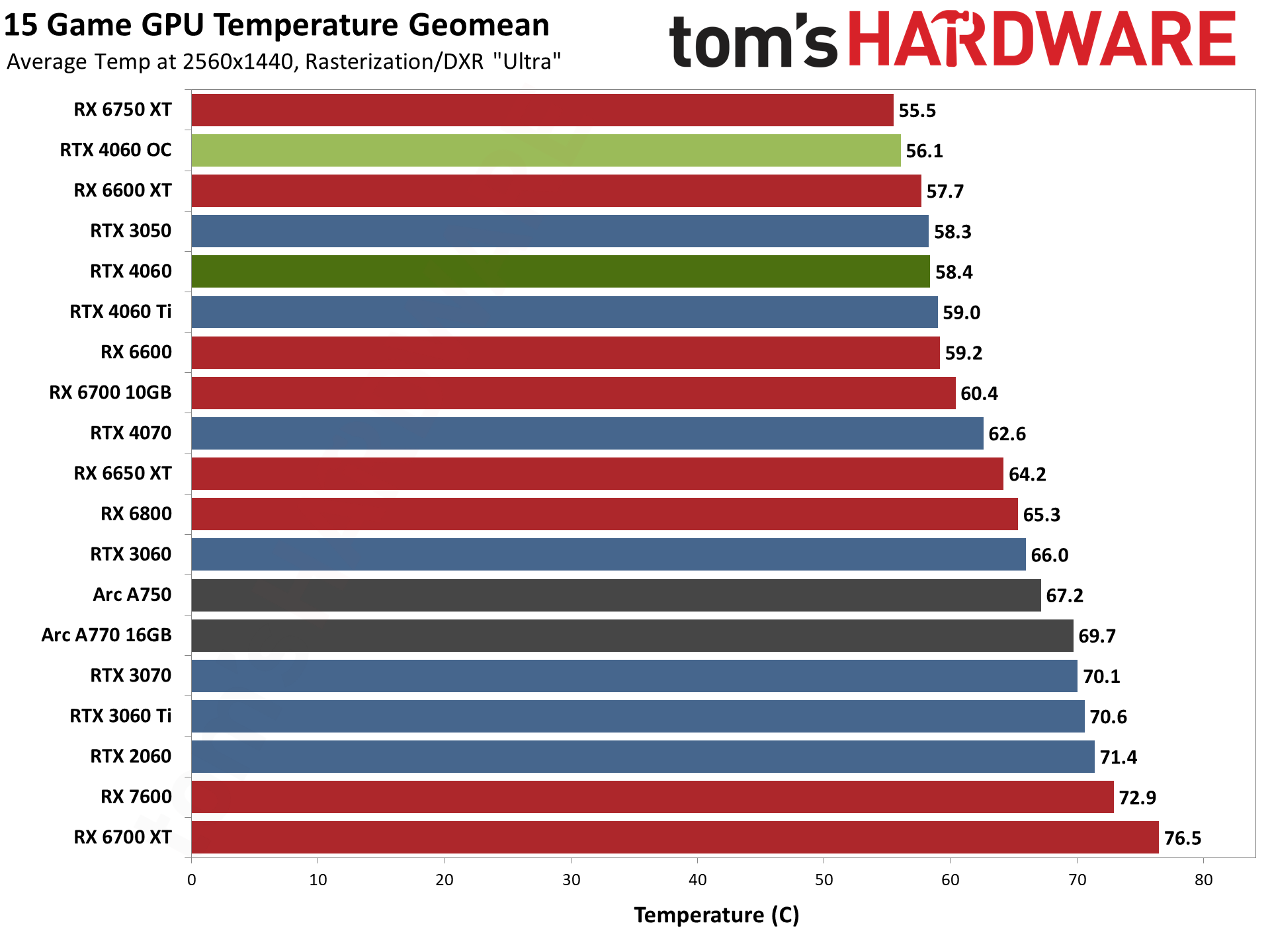
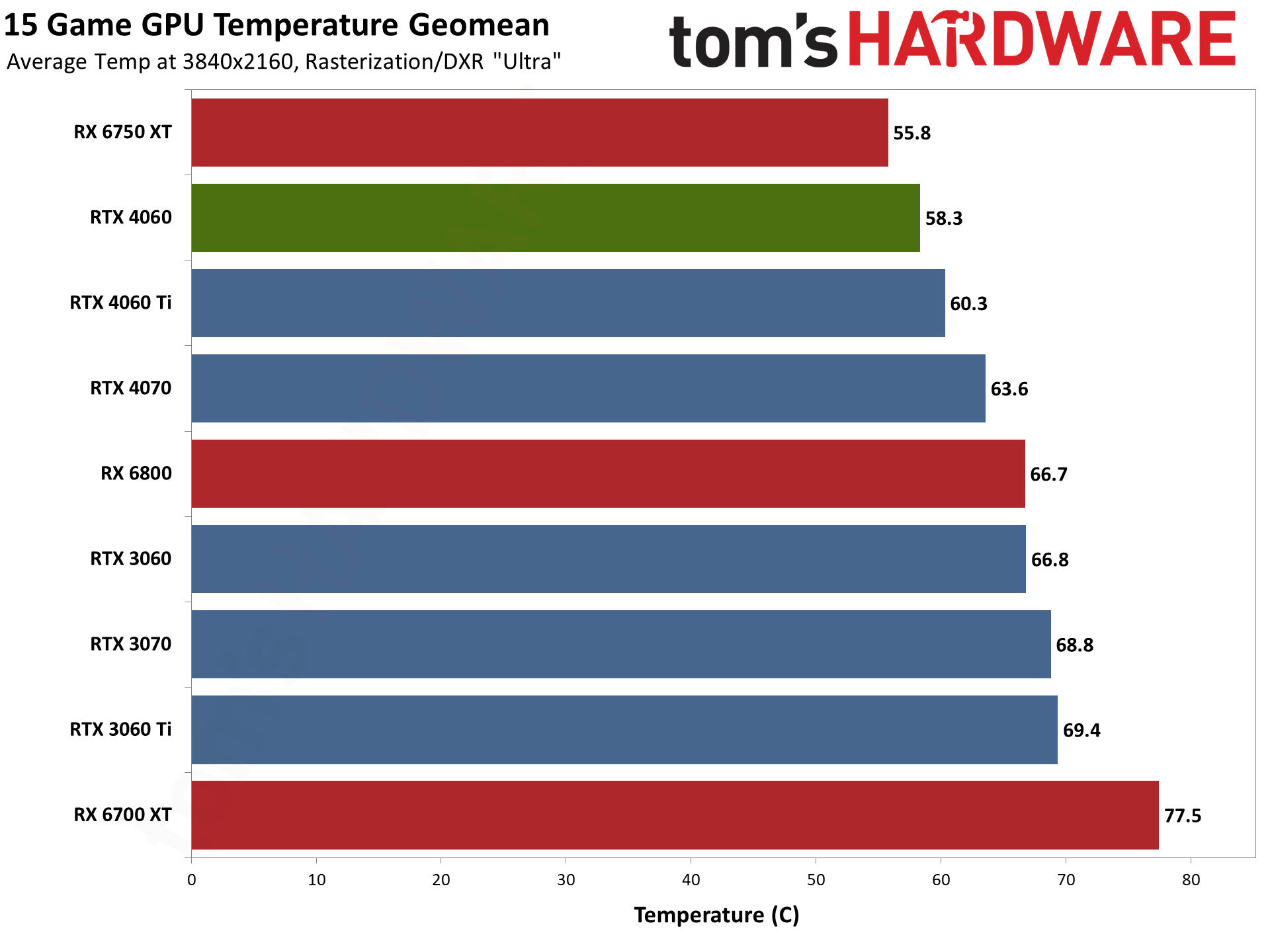
Temperatures are very good on the Asus RTX 4060 Dual OC. We expected as much, considering the relatively large heatsink, quality fans, and low TGP. On average across our test suite, the Asus card landed just under 60C, with the worst result being 61C in Control.
Overclocking didn't make things worse, thanks to our aggressive fan speed curve, with temperatures still staying under 60C. But temperatures don't exist in a vacuum; we also have to look at noise levels.
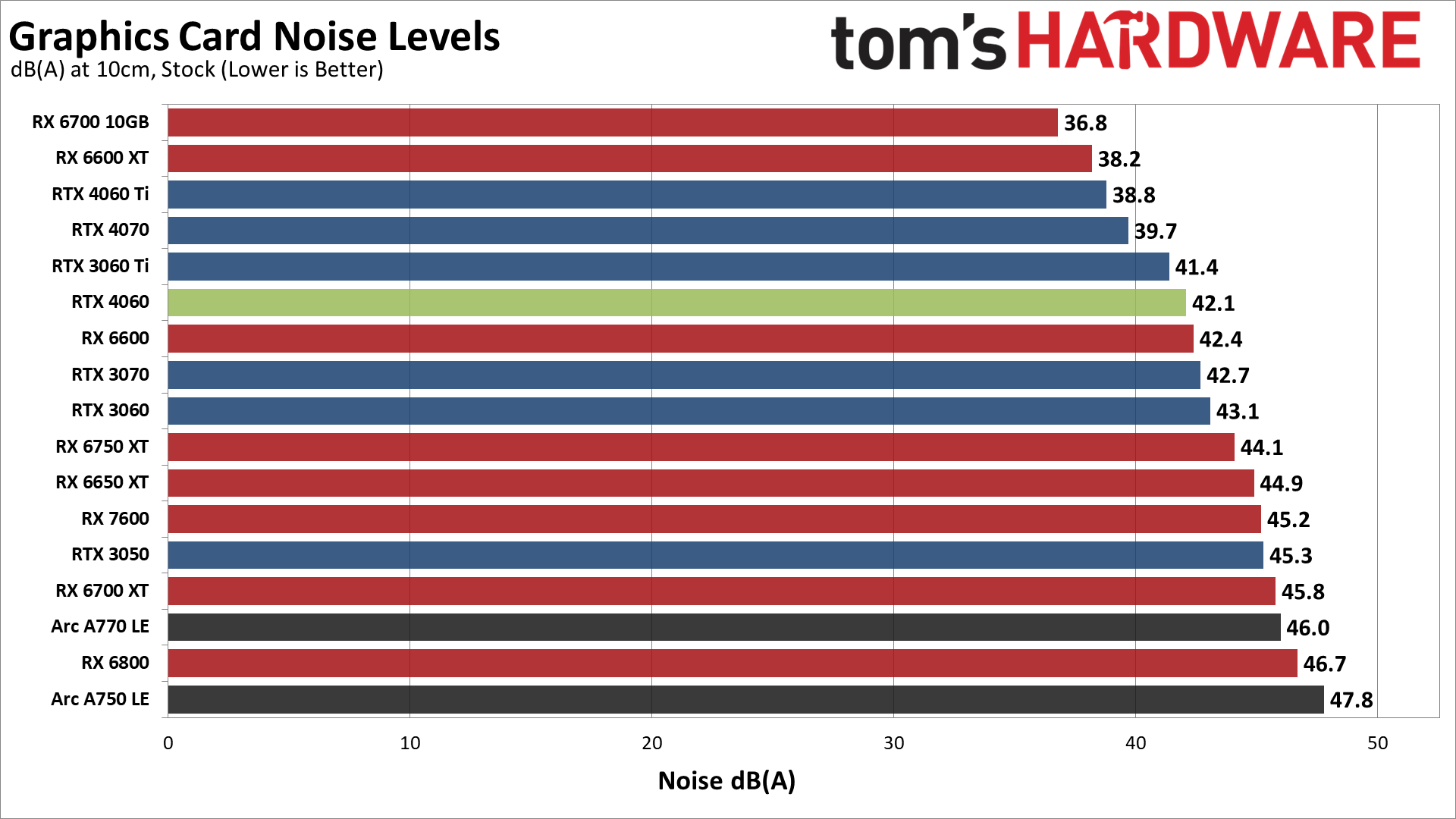
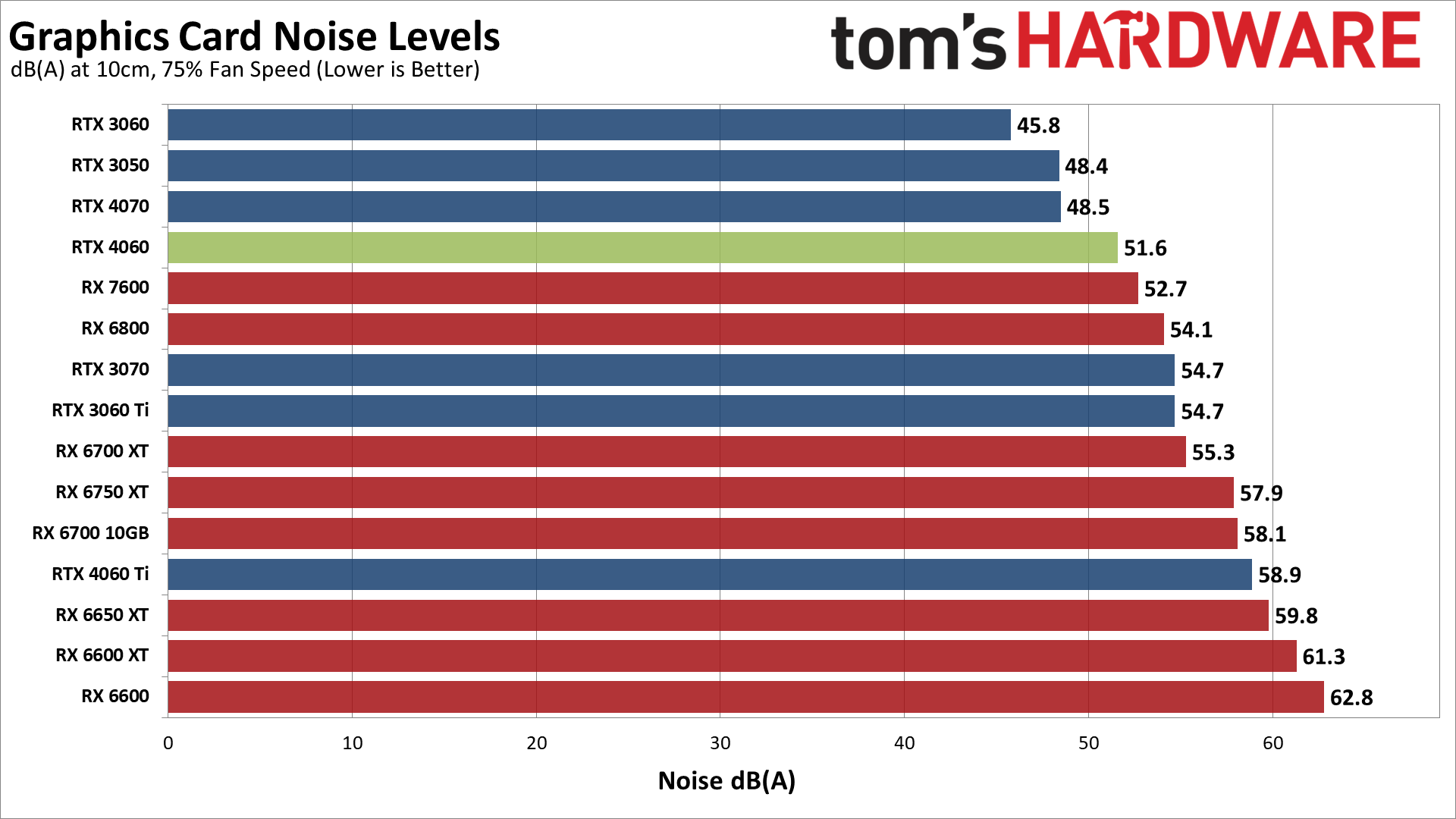
With an average power draw of 125W, the Asus card shouldn't have to work too hard to keep temperatures in check. For our noise testing, we run Metro Exodus for over 15 minutes and let things setting down. It's typically one of the most demanding games in our test suite, as far as GPU power draw goes, which means this should be a worst-case scenario for fan speed and noise.
We use an SPL (sound pressure level) meter placed 10cm from the card, with the mic aimed at the center of the right fan on the Asus card. This helps minimize the impact of other noise sources like the fans on the CPU cooler. The noise floor of our test environment and equipment is around 31–32 dB(A).
The Asus RTX 4060 Dual OC settled in at a fan speed of 47% after a few minutes. As expected, it doesn't make too much noise, registering 42.1 dB(A) on our meter. It's not the quietest card around, and we do have to wonder if some company might be daring enough to try a passively cooled RTX 4060. We've seen such cards in the past, and a 125W TGP ought to be manageable, assuming you have a bit of airflow from case fans.
We also tested with a static fan speed of 75%, and the Asus RTX 4060 generated 51.6 dB(A) of noise. The card shouldn't need to hit such a high fan speed under normal use, or even with overclocking, but it does give you some idea of what you can expect in warmer environments.
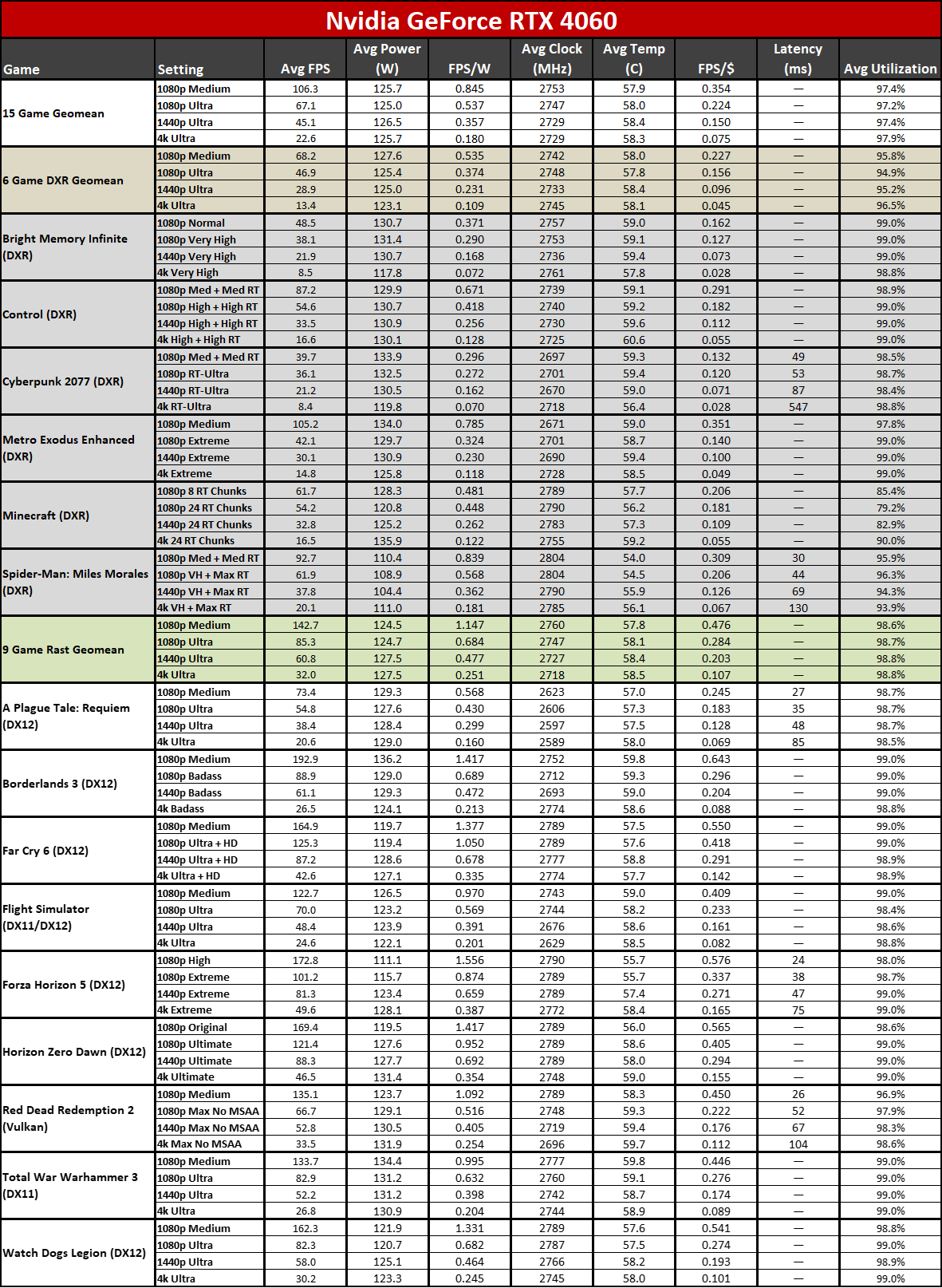
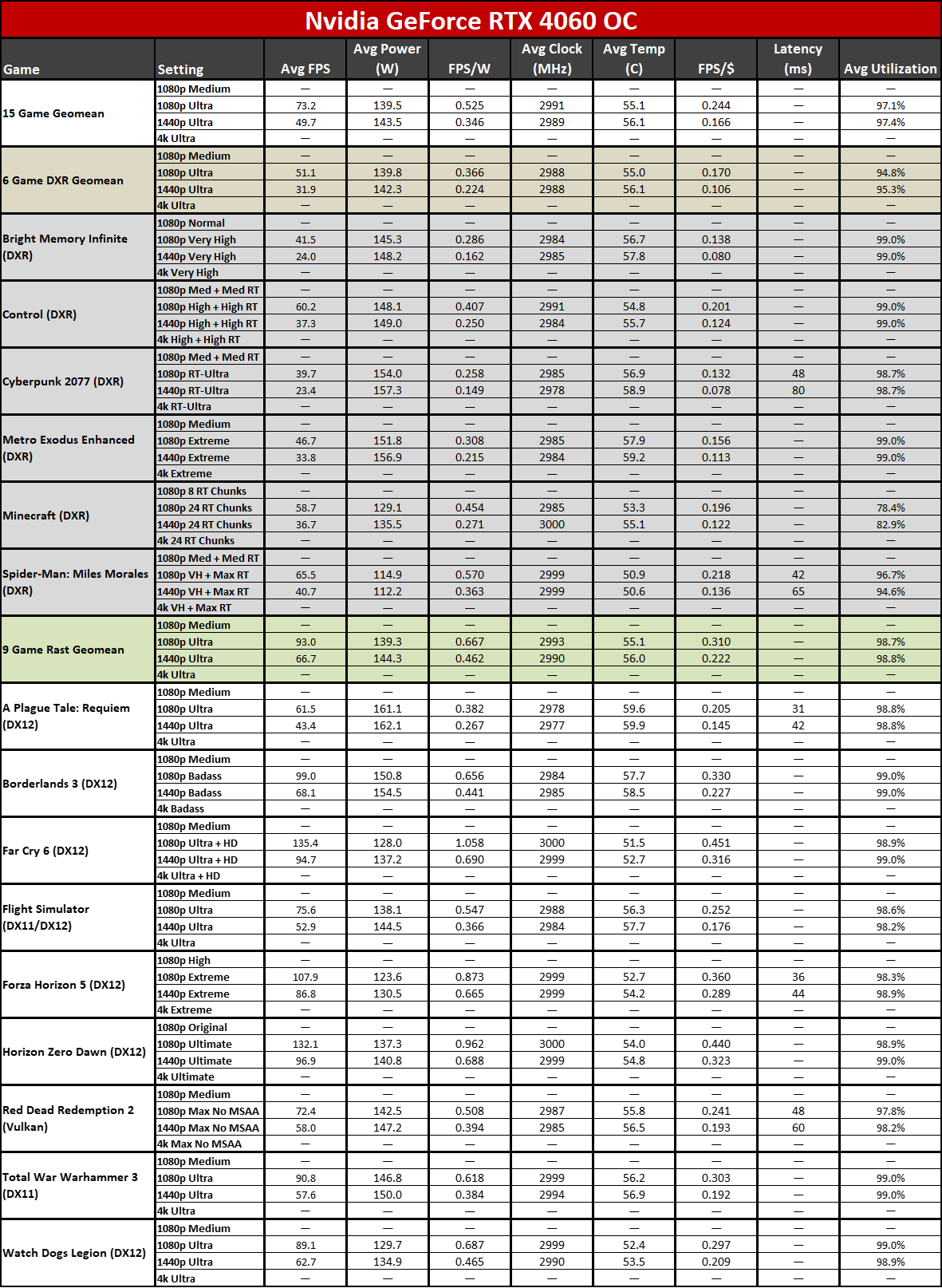
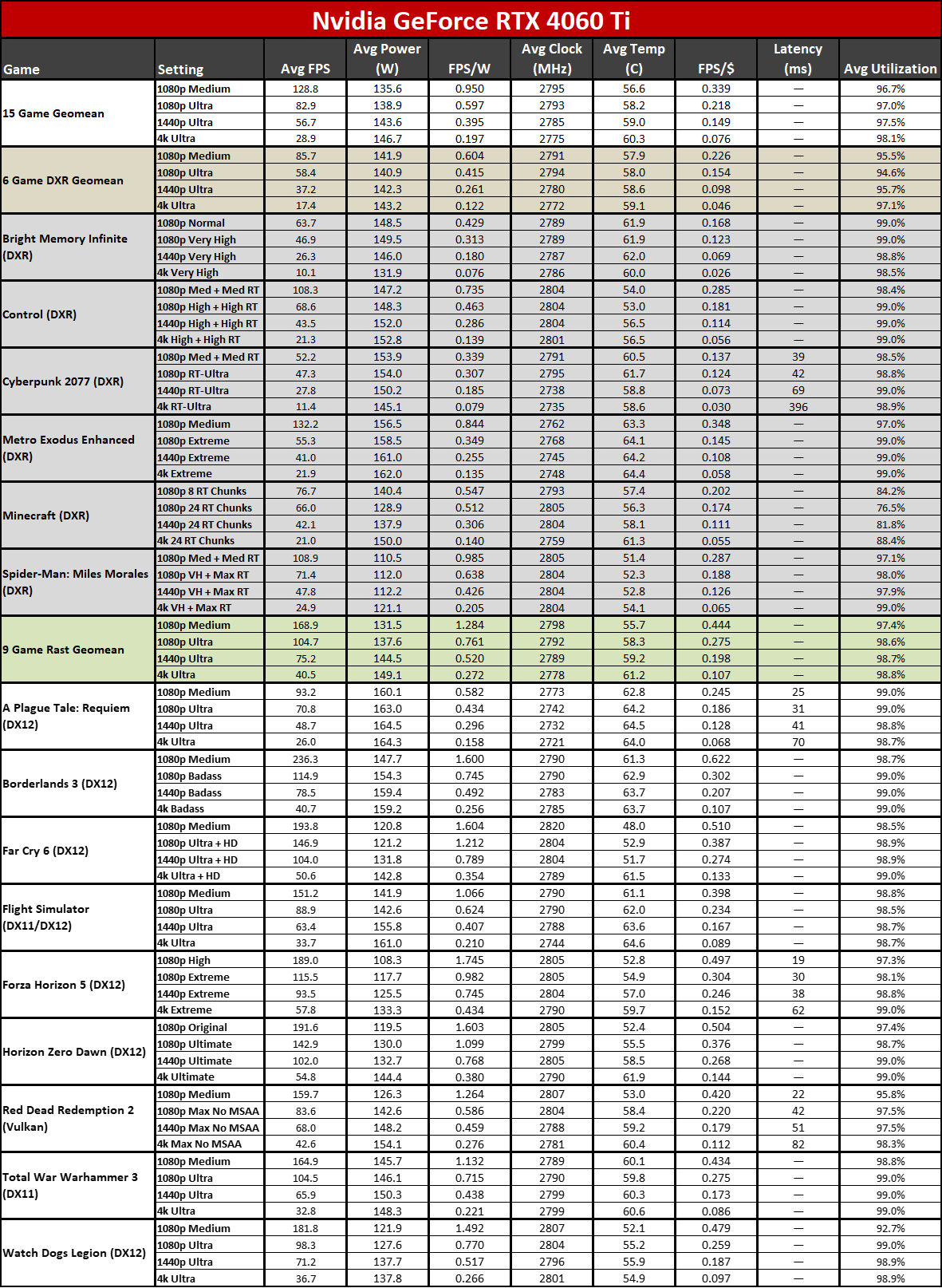
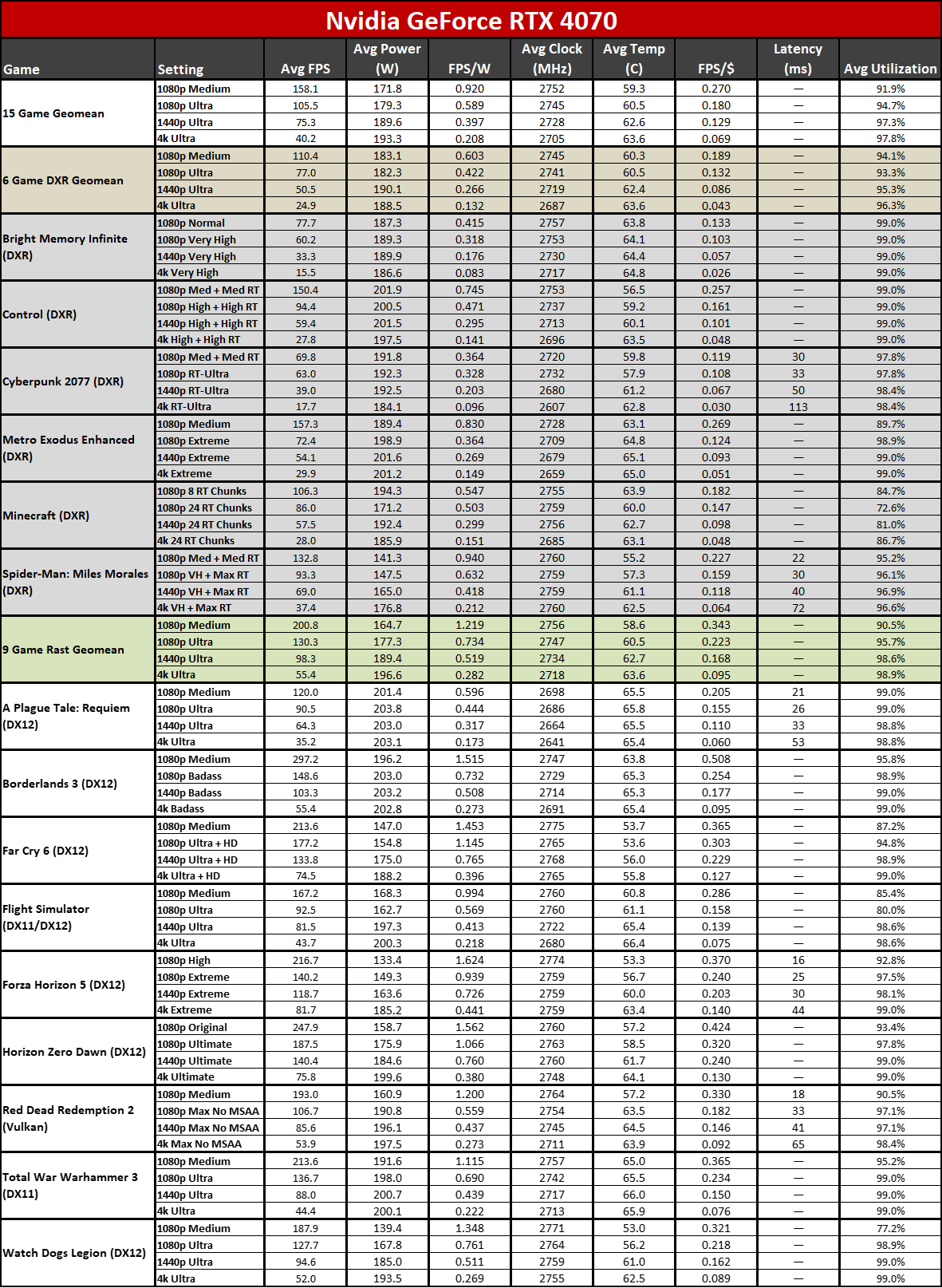
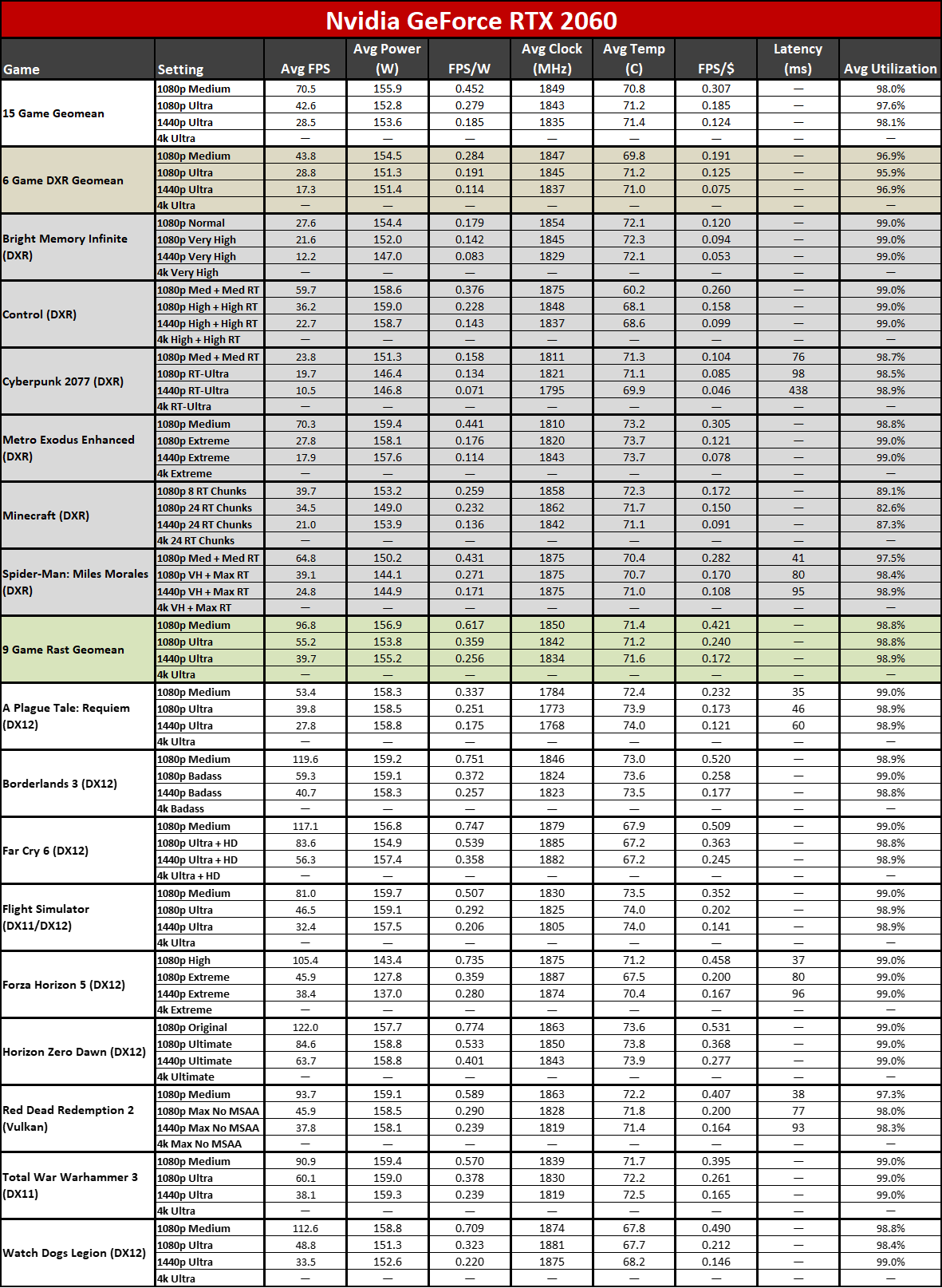
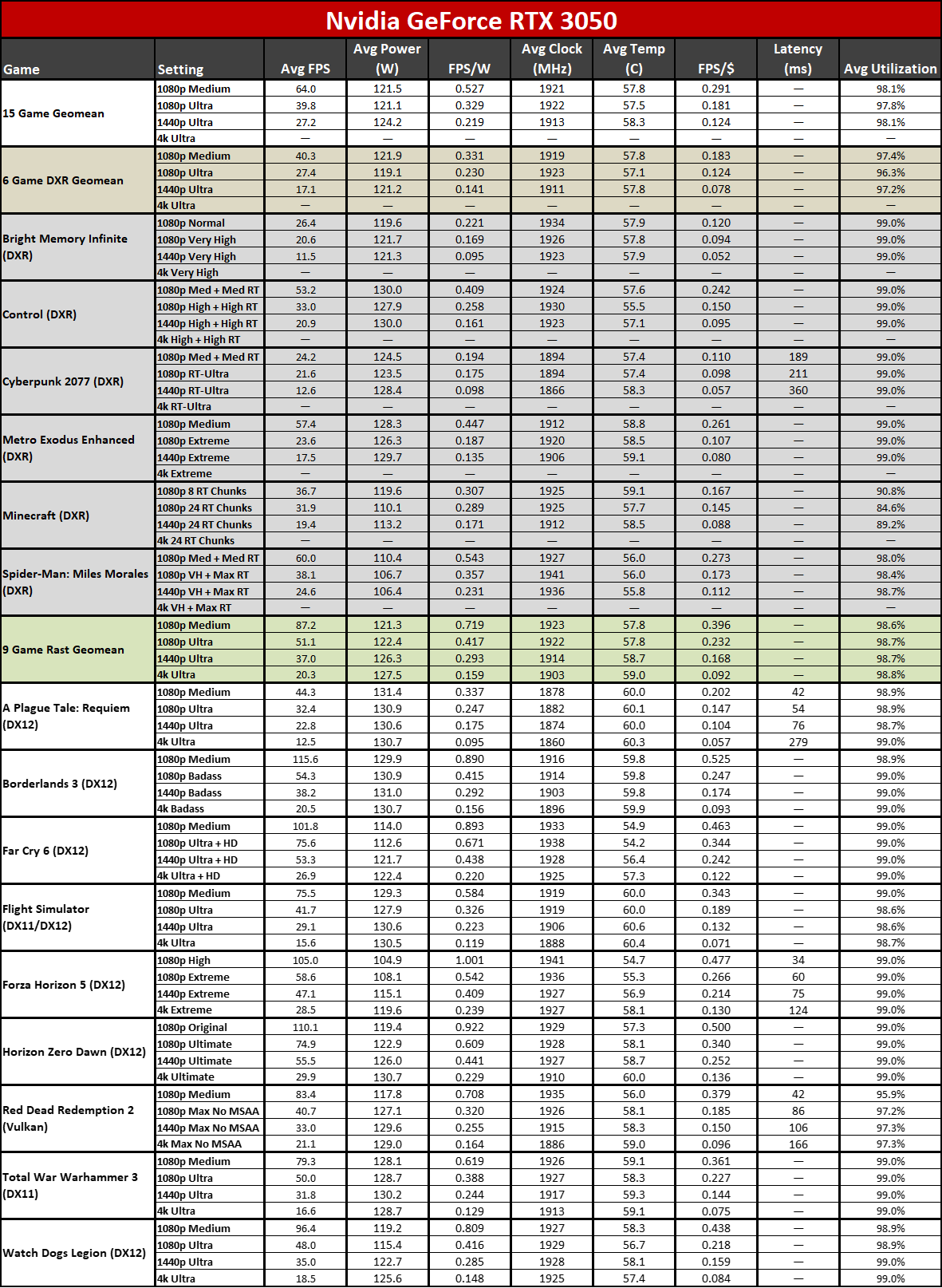
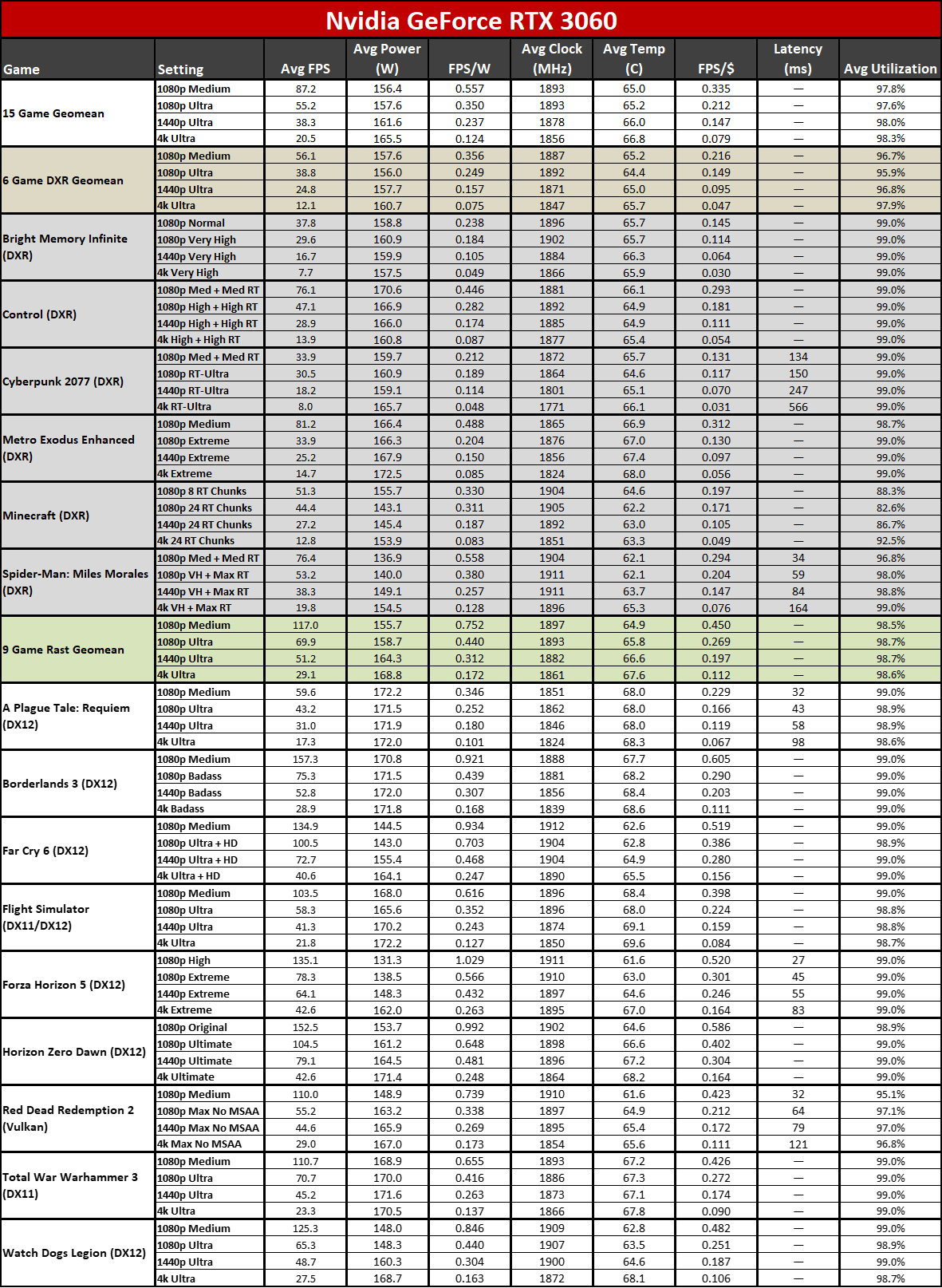
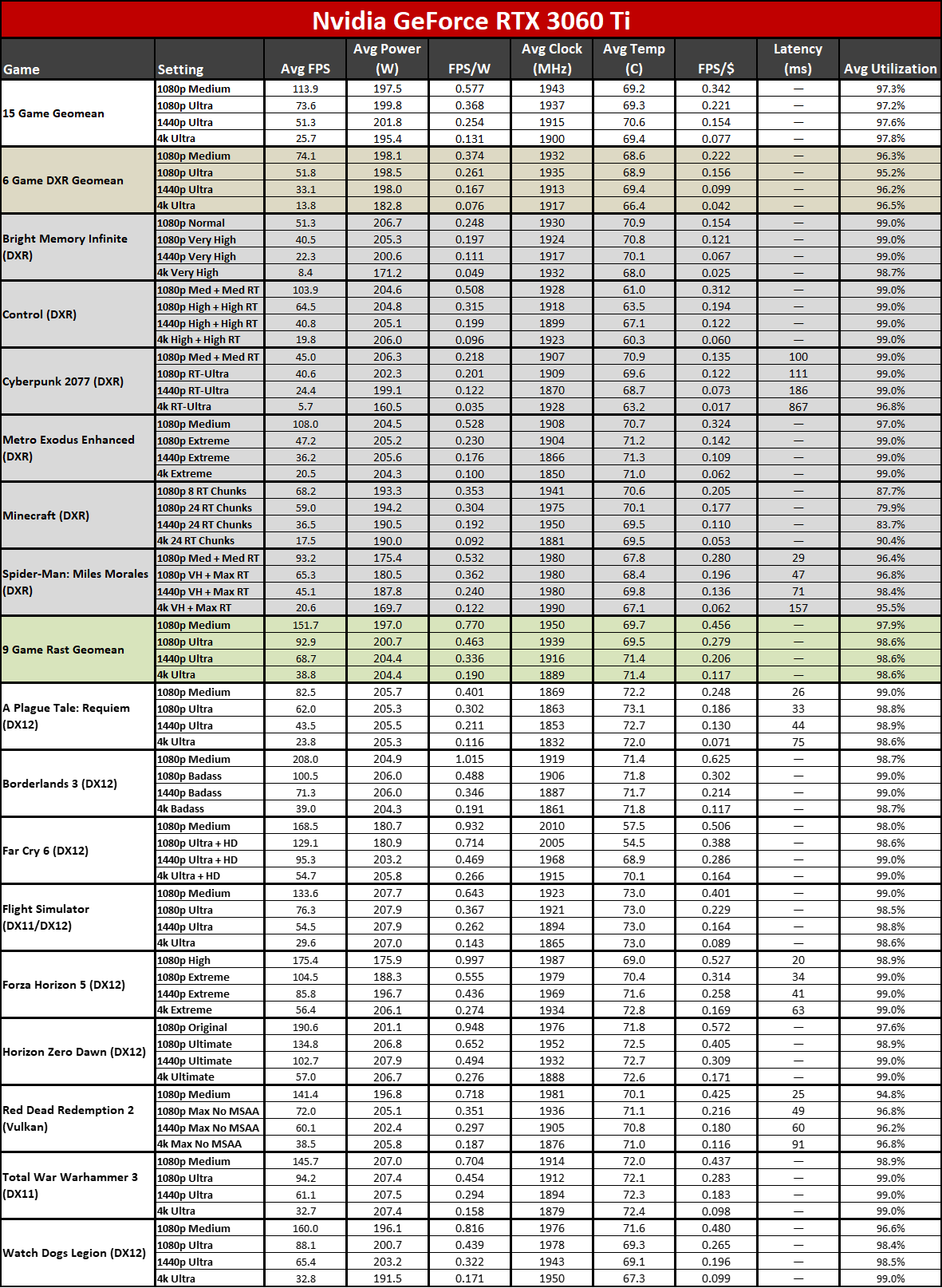
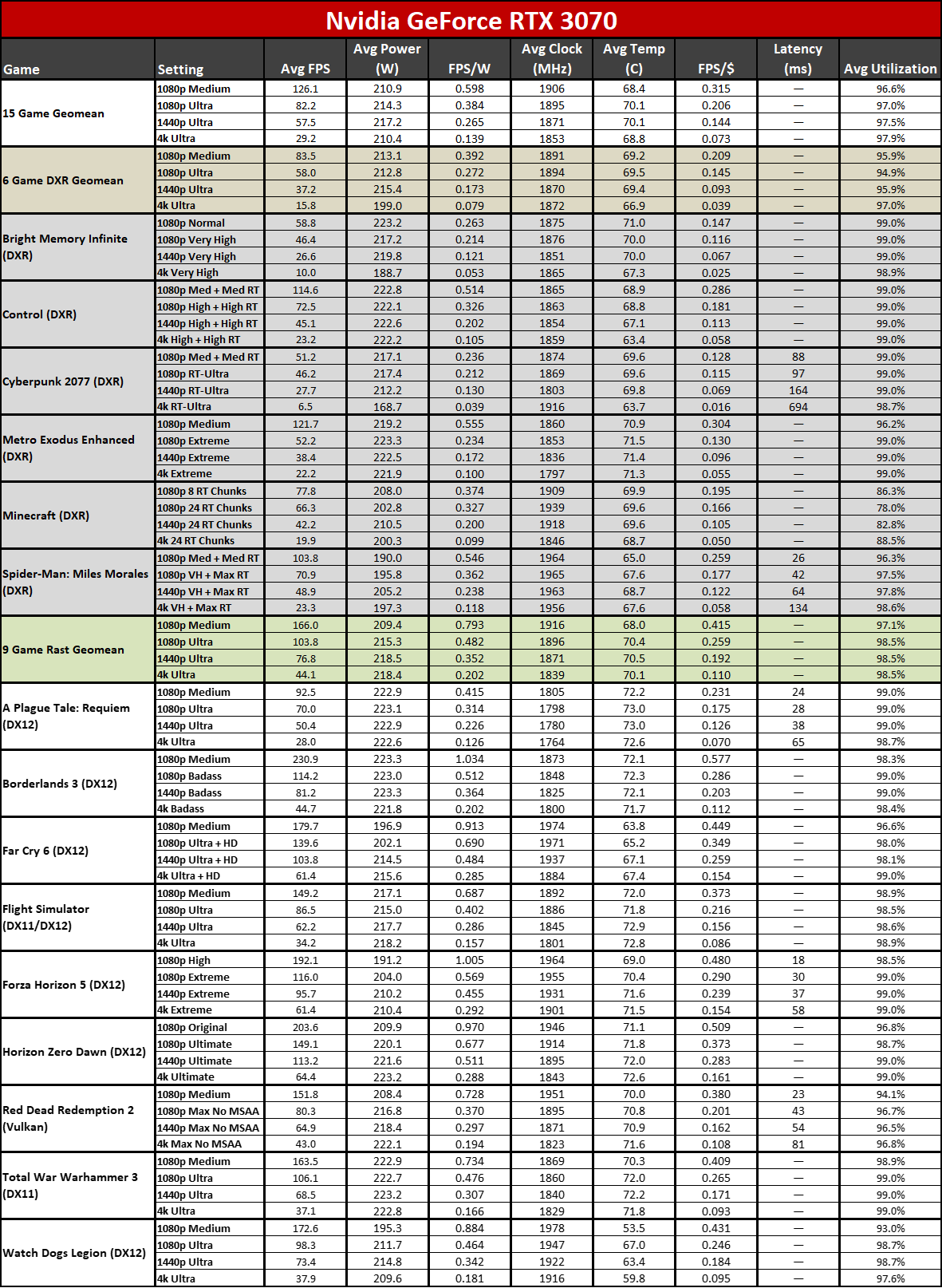
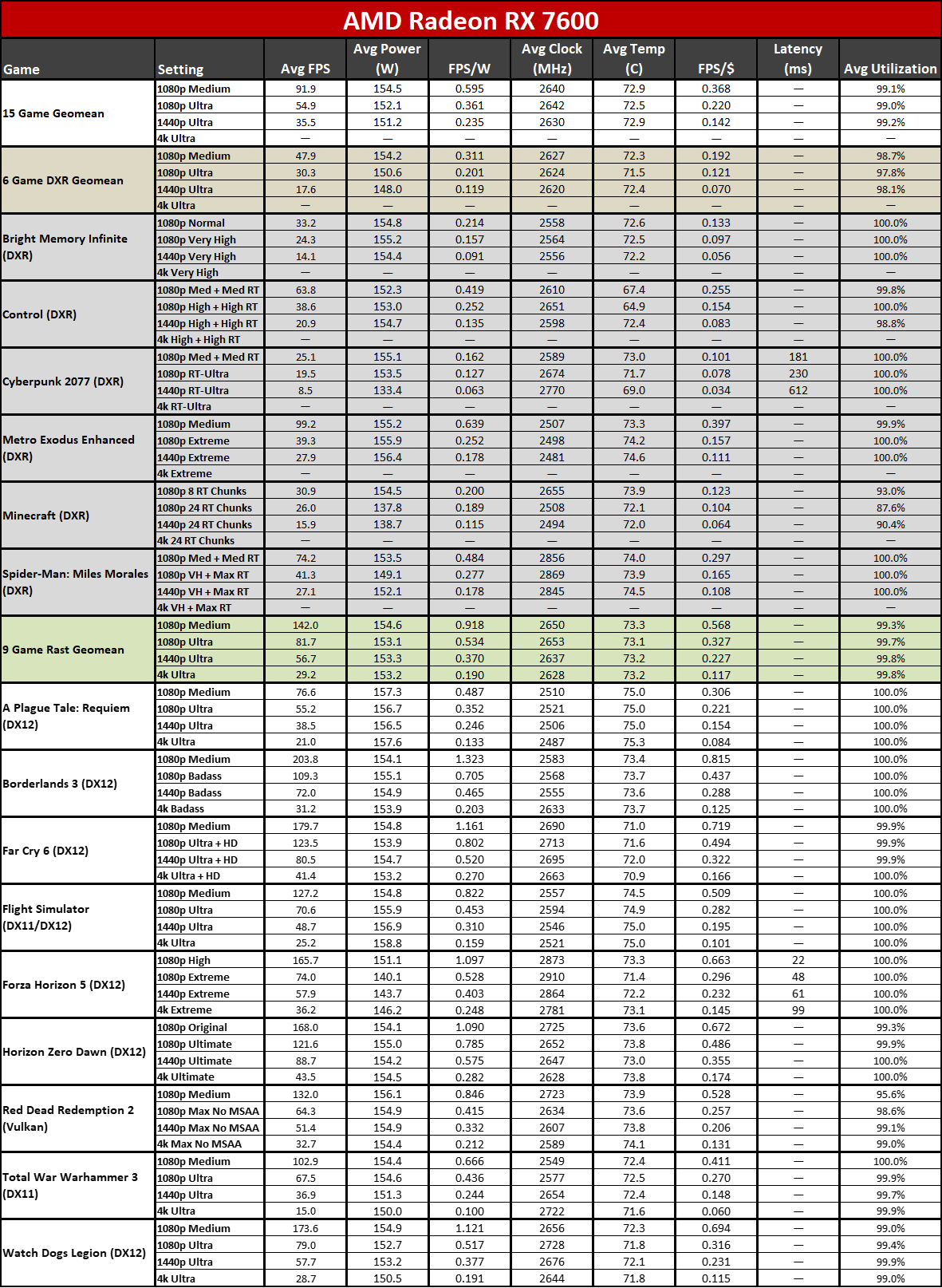
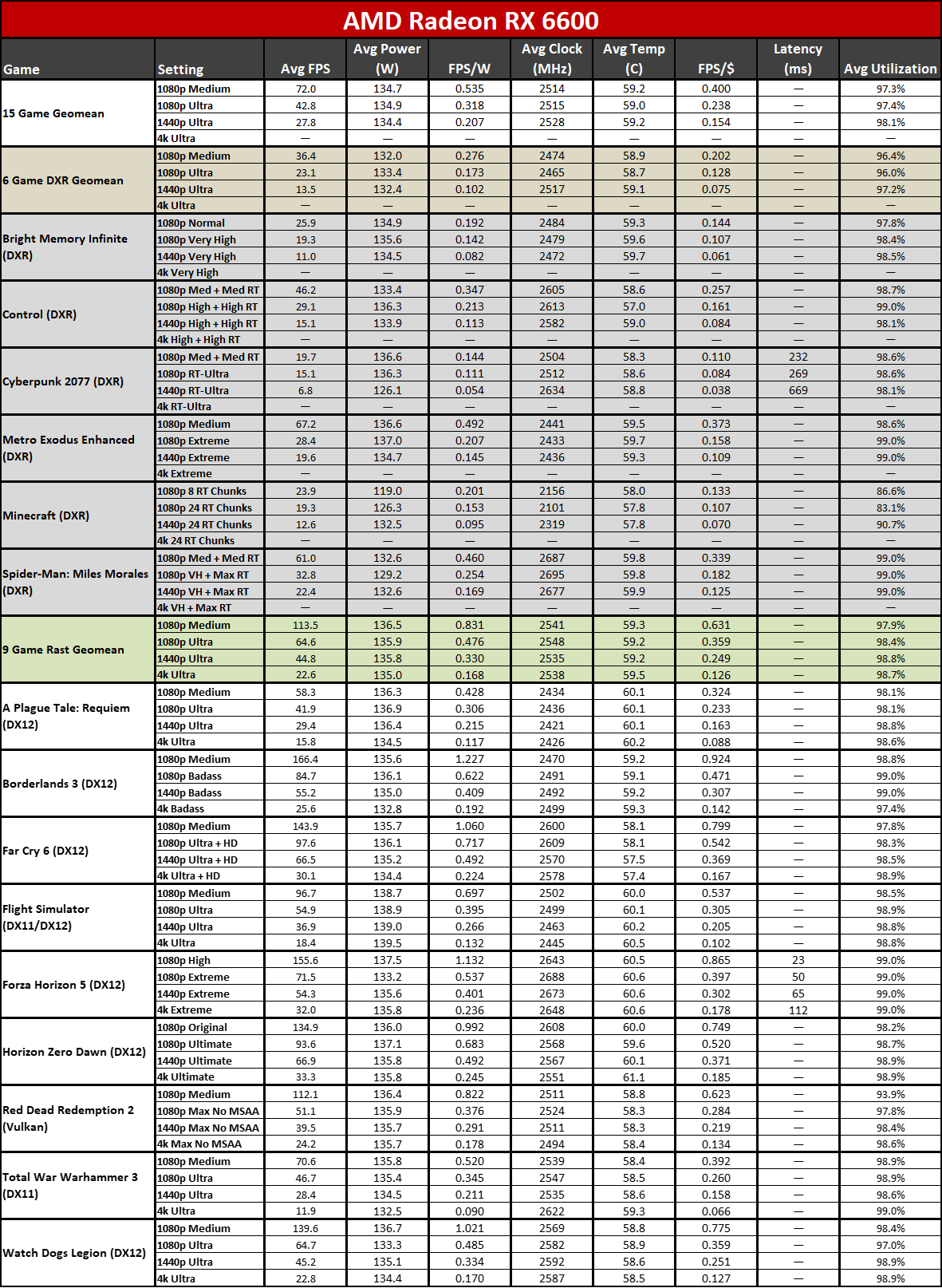
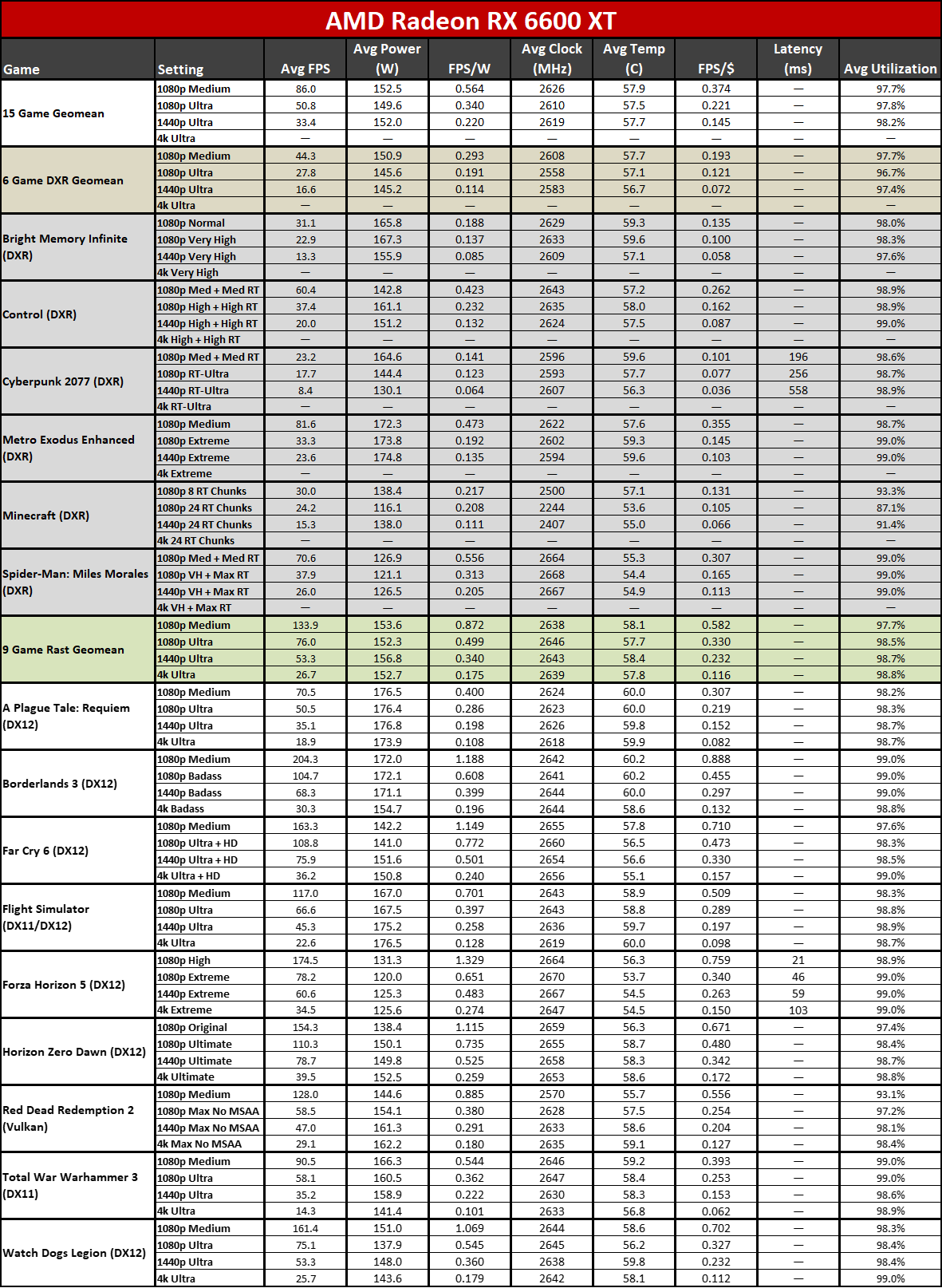
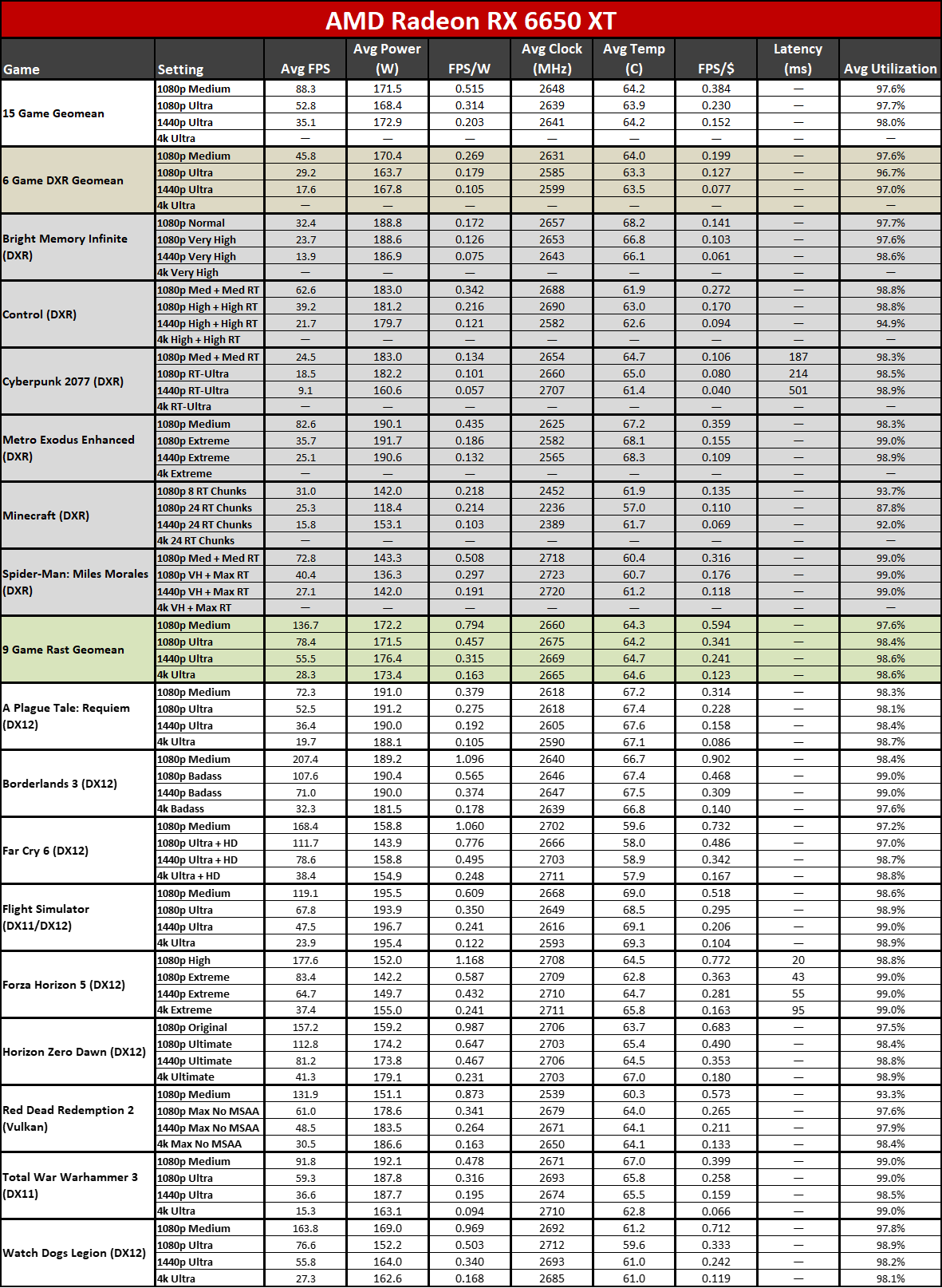
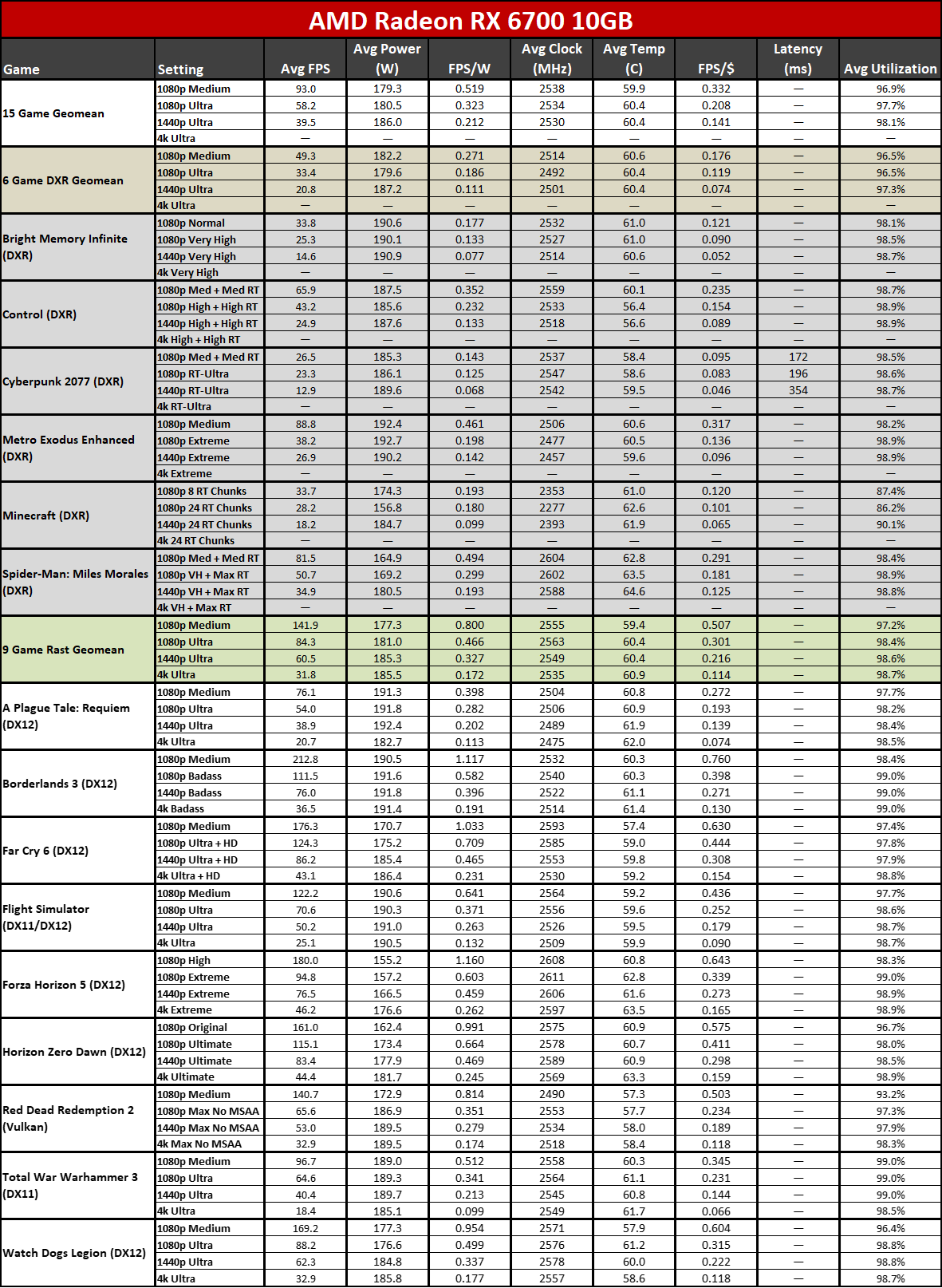
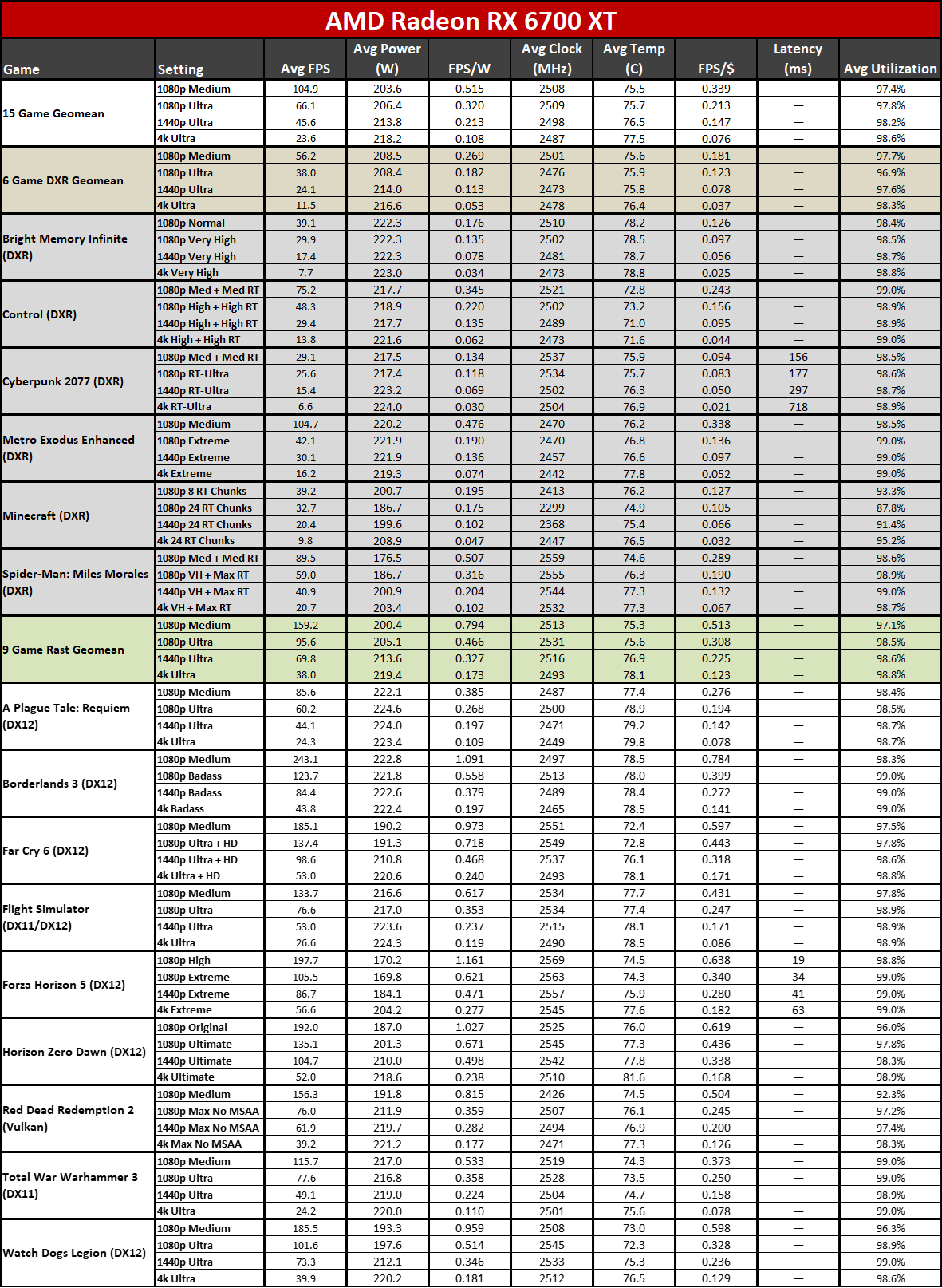
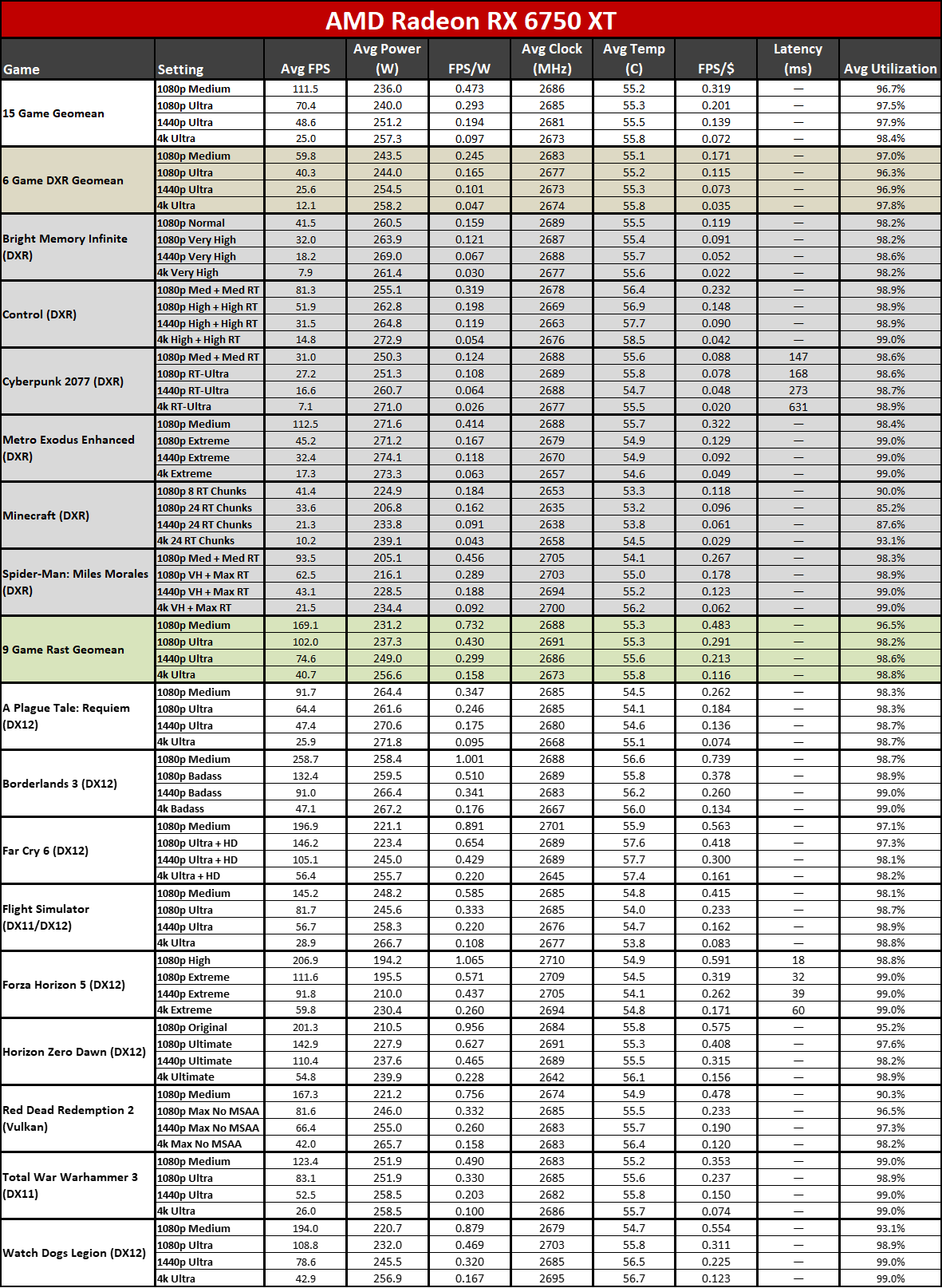
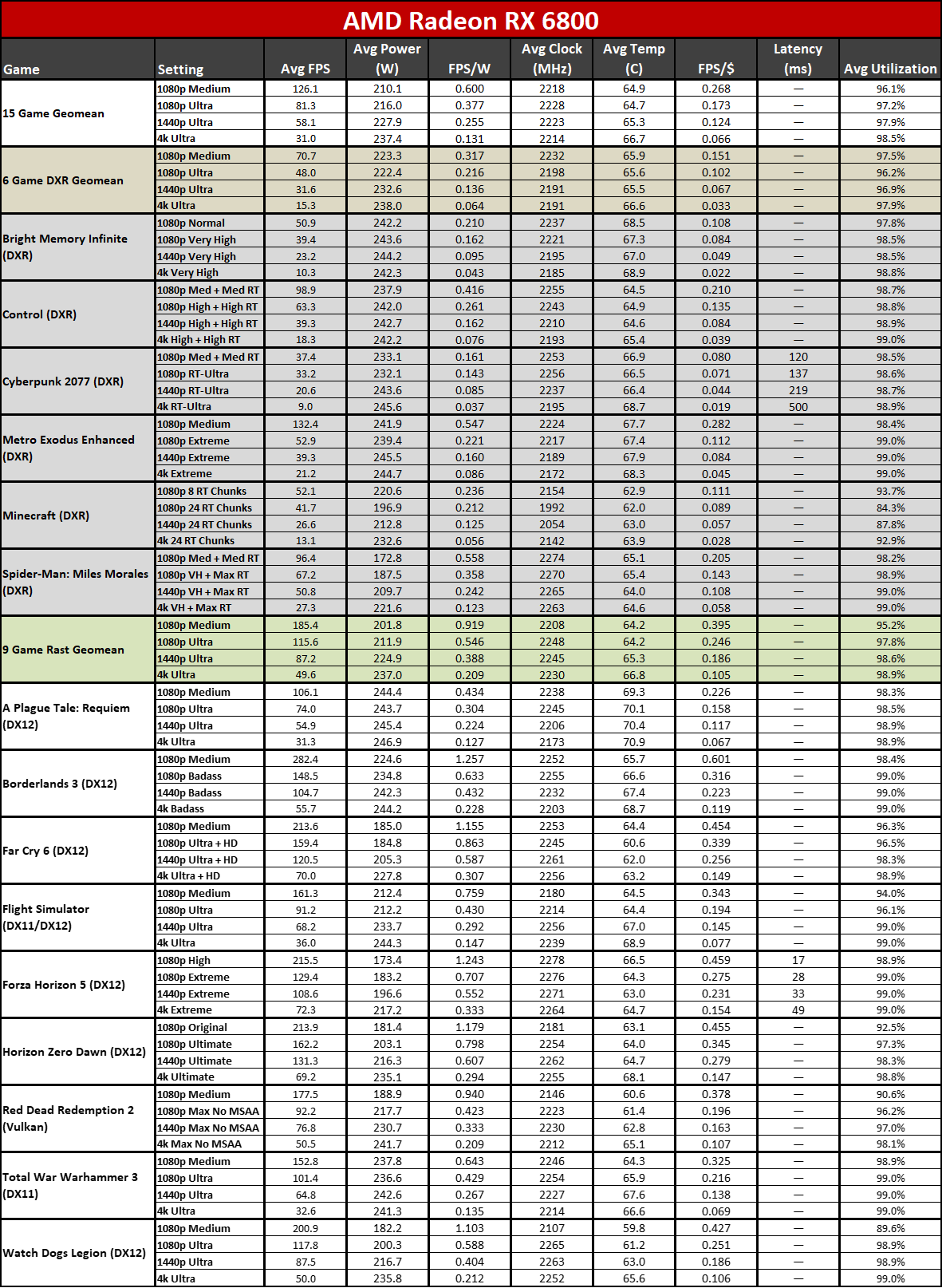
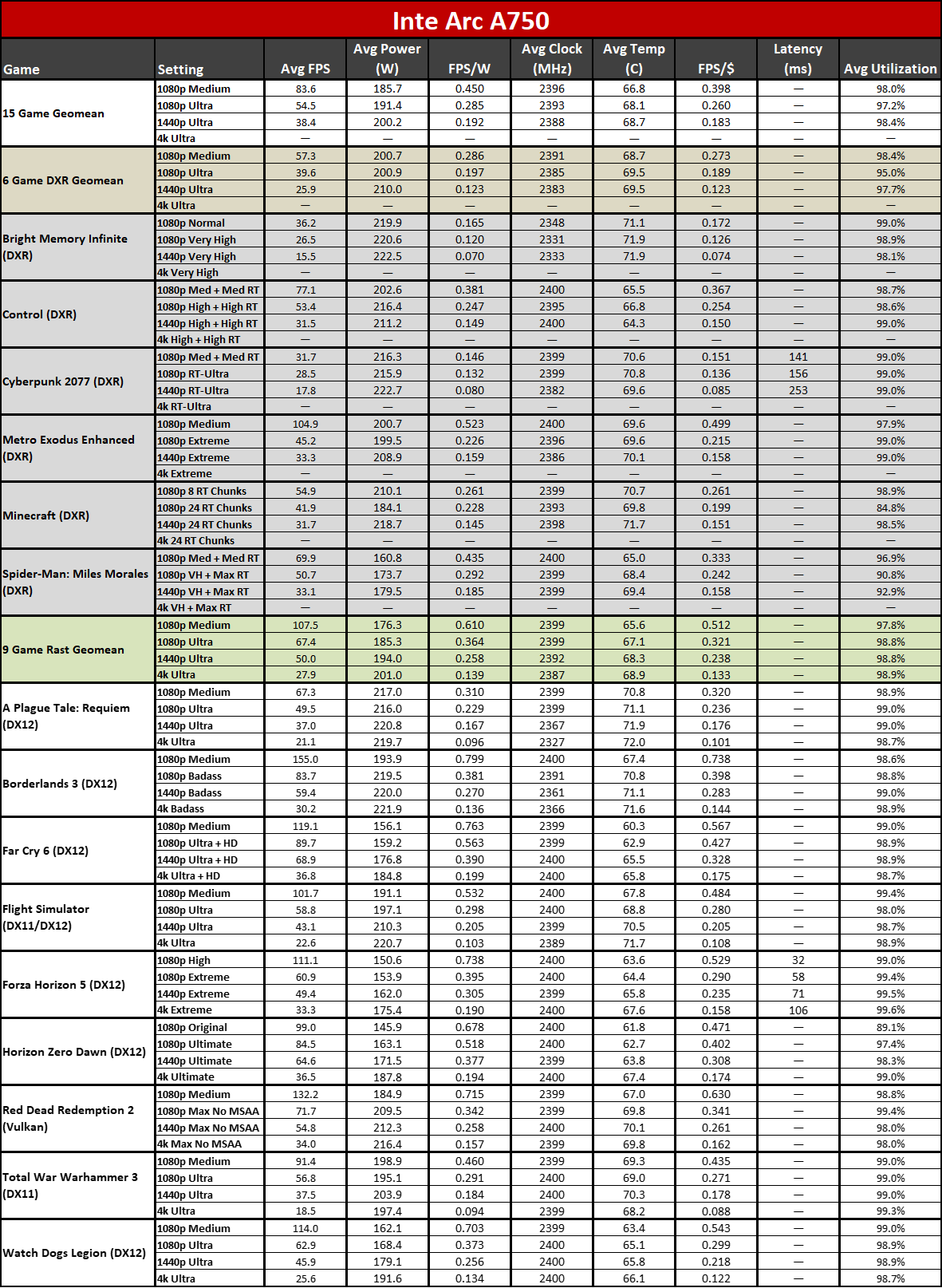
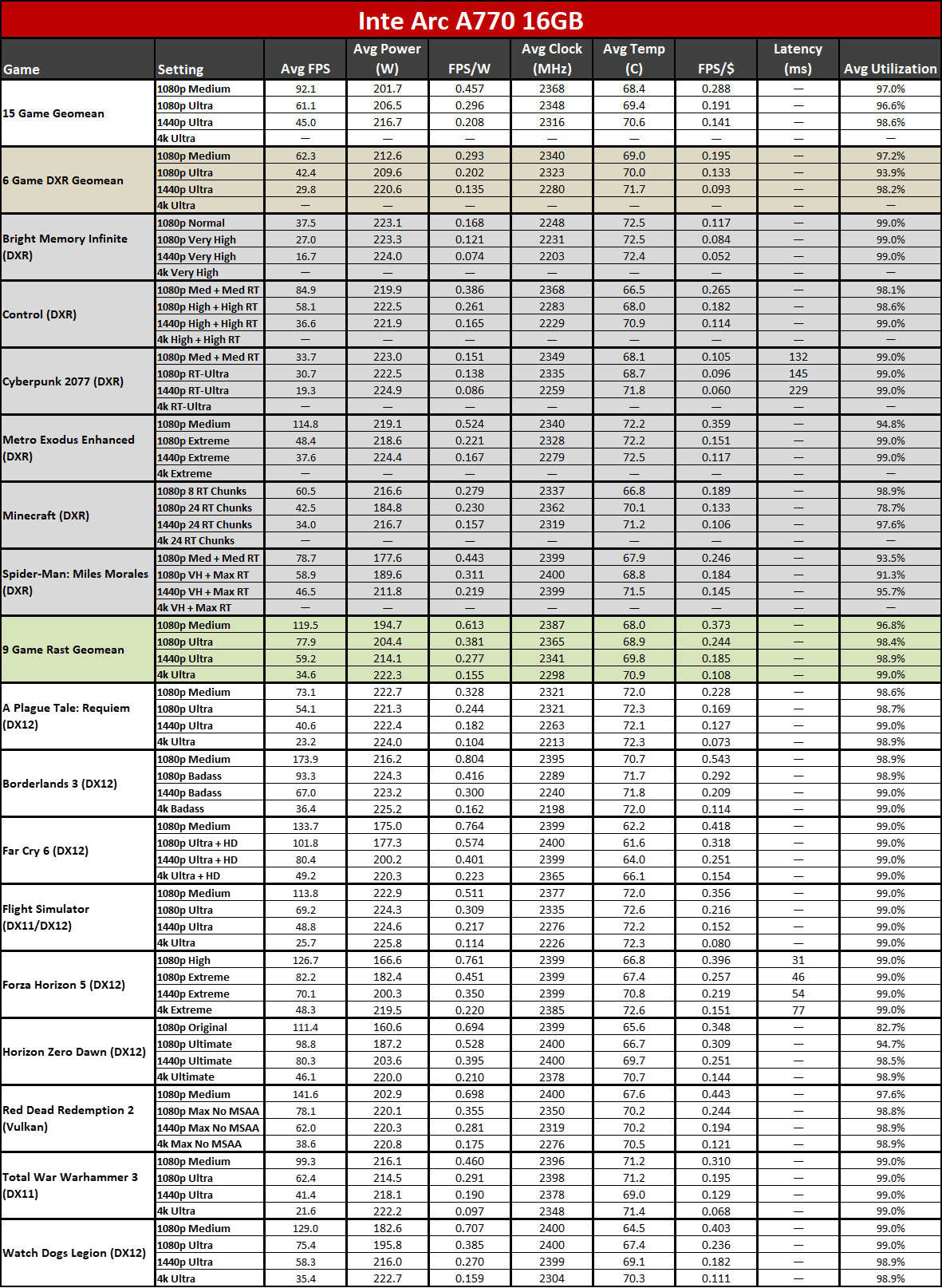
Here's the full rundown of all of our test results, including performance per watt and performance per dollar columns. We've covered most of this information elsewhere, though the value aspect isn't something we've addressed directly.
As you'd expect, lower priced cards like the RTX 4060 rank higher on the value scale than more expensive cards, though that's only looking at the cost of the GPU and not the full system. Based on current online prices, it's the best value Nvidia GPU, just edging out the RTX 4060 Ti... and the RTX 3060 Ti and RTX 3060. Those last two are basically on clearance now, though, and any sales are unlikely to last long.
That doesn't mean the RTX 4060 is the best value overall, however. AMD's RX 6600, 6600 XT, and 6650 XT all have slightly better value rankings, and the RX 6700 XT is only a hair behind the 4060. Prices on previous generation graphics cards have also been fluctuating quite a bit, so a good sale could easily push some other card to the top for a bit. Still, the 4060 does offer a good combination of features, price, and efficiency.
- MORE: Best Graphics Cards
- MORE: GPU Benchmarks and Hierarchy
- MORE: All Graphics Content
Get Tom's Hardware's best news and in-depth reviews, straight to your inbox.
Current page: Nvidia RTX 4060: Power, Clocks, Temps, and Noise
Prev Page Nvidia RTX 4060: Professional Content Creation and AI Performance Next Page Nvidia RTX 4060: Mainstream Compromises
Jarred Walton is a senior editor at Tom's Hardware focusing on everything GPU. He has been working as a tech journalist since 2004, writing for AnandTech, Maximum PC, and PC Gamer. From the first S3 Virge '3D decelerators' to today's GPUs, Jarred keeps up with all the latest graphics trends and is the one to ask about game performance.
-
healthy Pro-teen Nvidia's marketing be like: In germany you could maybe save $132 over 4 years if you play 20hours/week due to energy costs compared to the 3060. That is hilarious and obviously the tiny 50 tier die is efficient lol.Reply -
tennis2 @JarredWaltonGPU I feel compelled to give you huge props for the stellar write-up!Reply
Only made it halfway through the article, so I'll have to come back when I have time to finish, but wow....there's so much good stuff here. I hope everyone takes the time to fully read this article. I know that can get tricky once the "architecture launch" article is done for a generation. It's nice to be able to learn some new things from a "standard" GPU review even after I've been reading reviews from multiple sites of every GPU launched for the past.....10+ years. -
lmcnabney The expectations for GPUs going back decades is that the new generation will provide performance in-line with one or sometimes two tiers above it from the prior generation. That means the 4060 should perform somewhere between a 3060ti and 3070. It doesn't. It can't even meet the abilities of the 3060ti. This card should not receive a positive review because it fails at meeting the minimum performance standard.Reply -
oofdragon Utterly crap.. can't even match a 3060Ti, but of course since that amazing accomplishment goes to the failure 4060Ti. Meanwhile anyone can get a 6700XT with 12GB VRAM for half the price. FAIL FAIL FAIL FAIL FAIL FAIL FAILReply -
Elusive Ruse Thanks for the review, however your test suite is outdated. You need to consider bringing a host of newer releases.Reply -
DSzymborski Replyoofdragon said:Utterly crap.. can't even match a 3060Ti, but of course since that amazing accomplishment goes to the failure 4060Ti. Meanwhile anyone can get a 6700XT with 12GB VRAM for half the price. FAIL FAIL FAIL FAIL FAIL FAIL FAIL
You're comparing a used GPU to a new GPU. That increased risk is a fundamental difference which has to be addressed in any comparison. -
Elusive Ruse Reply
You can get a new one around $310-$320DSzymborski said:You're comparing a used GPU to a new GPU. That increased risk is a fundamental difference which has to be addressed in any comparison. -
DSzymborski ReplyElusive Ruse said:You can get a new one around $310-$320
He's literally quoting $200 above as his point of comparison. That's a used card. -
randyh121 Reply
lol the 6700XT is nearly 500$ and the 4060 runs betteroofdragon said:Utterly crap.. can't even match a 3060Ti, but of course since that amazing accomplishment goes to the failure 4060Ti. Meanwhile anyone can get a 6700XT with 12GB VRAM for half the price. FAIL FAIL FAIL FAIL FAIL FAIL FAIL
keep lying to yourself amd-cope
